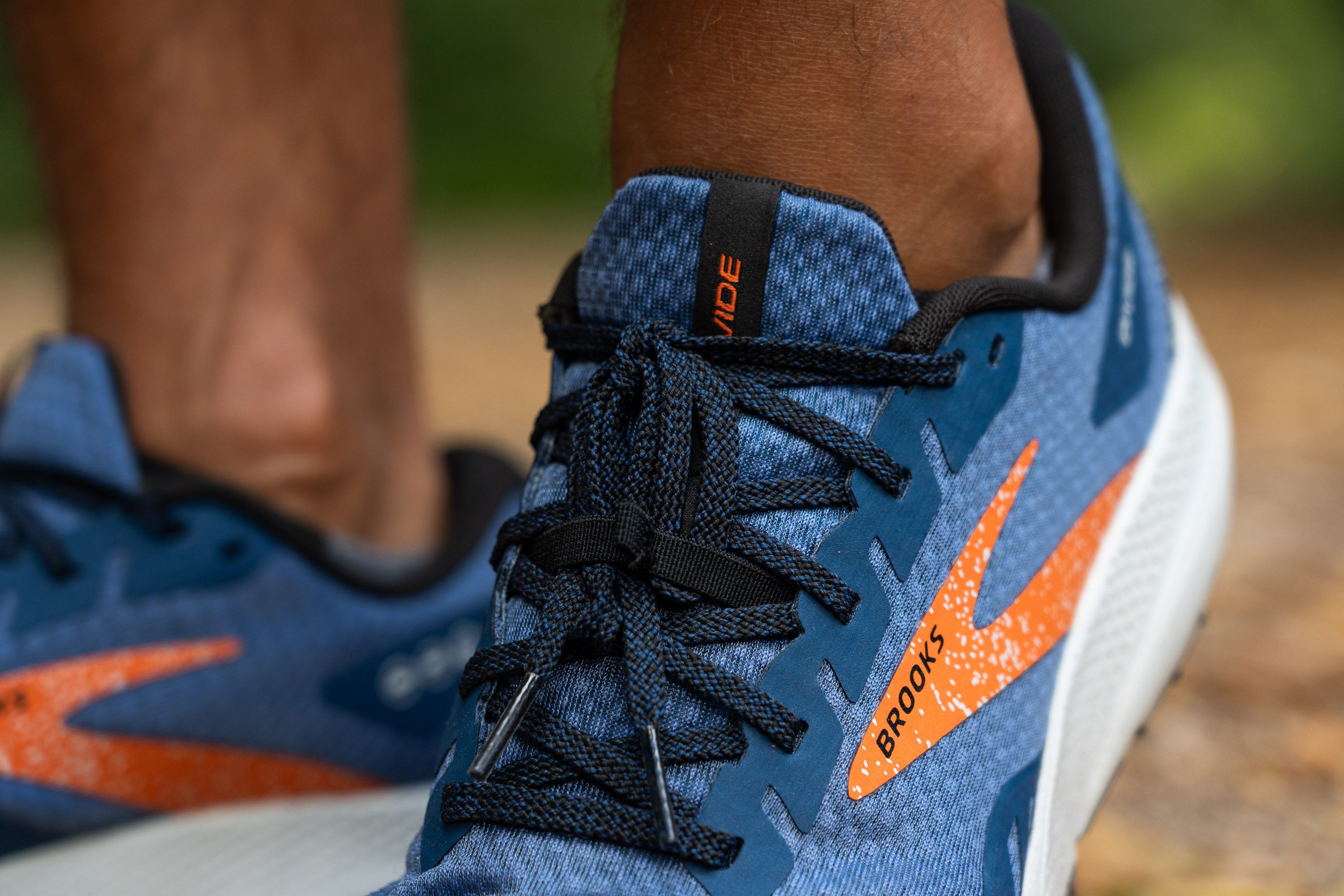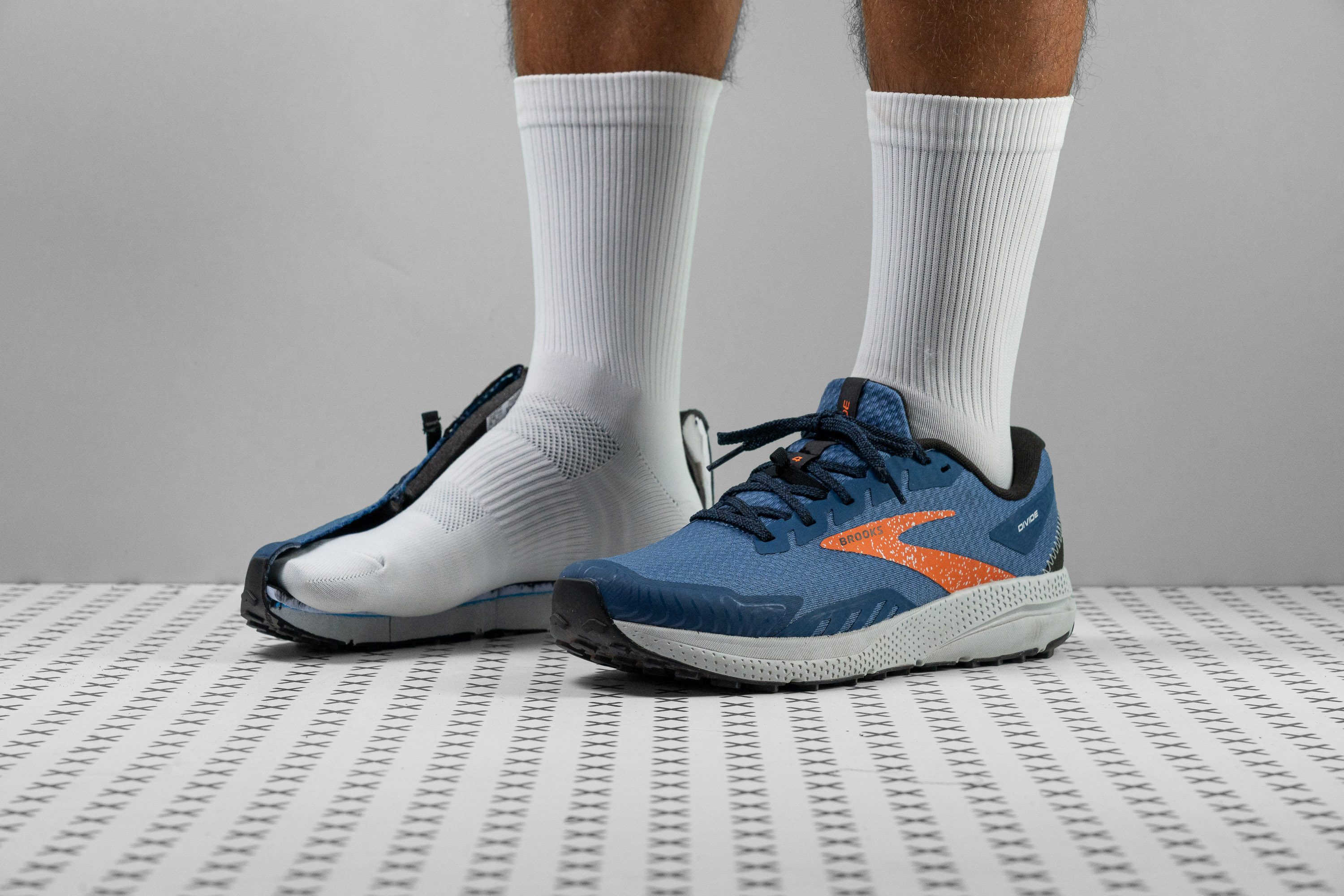Our verdict
Pros
- Good impact protection
- Smooth ride
- Feels stable underfoot
- Works well as a hybrid shoe
- Suitable for hiking
- Secure lockdown
- Comfy fit
- Accommodates wide feet
- Grippy outsole
- Easy on the wallet
Cons
- Midsole feels a little dull
- Not for technical or muddy trails
- Overall issues with durability
Audience verdict
Comparison
The most similar running shoes compared
+ + Add a shoe | |||||
|---|---|---|---|---|---|
| Audience score | 86 Good! | 75 Bad! | 74 Bad! | 87 Great! | |
| Price | £100 | £100 | £100 | £140 | |
| Trail terrain | Light | Light | Light | Light | |
| Arch support | Neutral | Neutral | Neutral | Neutral | |
| Weight lab Weight brand | 9.9 oz / 282g 10.4 oz / 294.8g | 10.7 oz / 302g 9.9 oz / 282g | 11 oz / 312g 11.5 oz / 326g | 9.9 oz / 281g 9.9 oz / 280g | |
| Drop lab Drop brand | 9.2 mm 8.0 mm | 8.0 mm 8.0 mm | 8.2 mm | 7.2 mm 6.0 mm | |
| Strike pattern | HeelMid/forefoot | HeelMid/forefoot | HeelMid/forefoot | Mid/forefoot | |
| Size | True to size | Slightly small | True to size | True to size | |
| Midsole softness | Balanced | Balanced | Balanced | Soft | |
| Difference in midsole softness in cold | Big | Normal | Small | Small | |
| Plate | ✗ | ✗ | ✗ | Rock plate | |
| Toebox durability | Bad | Good | Decent | Decent | |
| Heel padding durability | Bad | Decent | Bad | Good | |
| Outsole durability | Decent | Decent | Good | Good | |
| Breathability | Moderate | Breathable | Moderate | Moderate | |
| Width / fit | Medium | Medium | Narrow | Medium | |
| Toebox width | Wide | Wide | Medium | Medium | |
| Stiffness | Stiff | Stiff | Stiff | Stiff | |
| Torsional rigidity | Moderate | Moderate | Moderate | Stiff | |
| Heel counter stiffness | Stiff | Moderate | Moderate | Moderate | |
| Lug depth | 2.7 mm | 2.4 mm | 2.9 mm | 2.5 mm | |
| Heel stack lab Heel stack brand | 32.1 mm 30.0 mm | 32.2 mm 32.0 mm | 33.8 mm | 31.0 mm 32.6 mm | |
| Forefoot lab Forefoot brand | 22.9 mm 22.0 mm | 24.2 mm 24.0 mm | 25.6 mm | 23.8 mm 26.6 mm | |
| Widths available | Normal | NormalWide | NormalWideX-Wide | Normal | |
| Season | All seasons | SummerAll seasons | All seasons | All seasons | |
| Removable insole | ✓ | ✓ | ✓ | ✓ | |
| Orthotic friendly | ✓ | ✓ | ✓ | ✓ | |
| Ranking | #190 Top 50% | #360 Bottom 6% | #372 Bottom 2% | #150 Top 40% | |
| Popularity | #315 Bottom 17% | #165 Top 44% | #321 Bottom 16% | #307 Bottom 19% |
Who should buy
We recommend the Divide 4 to runners who:
- Need a lightweight, neutral trail shoe with a roomy toebox
- Are new to trail running and want a versatile shoe that’s also capable for road running or hiking days
- Want a trail shoe that’s well cushioned and ready to take on long distance efforts
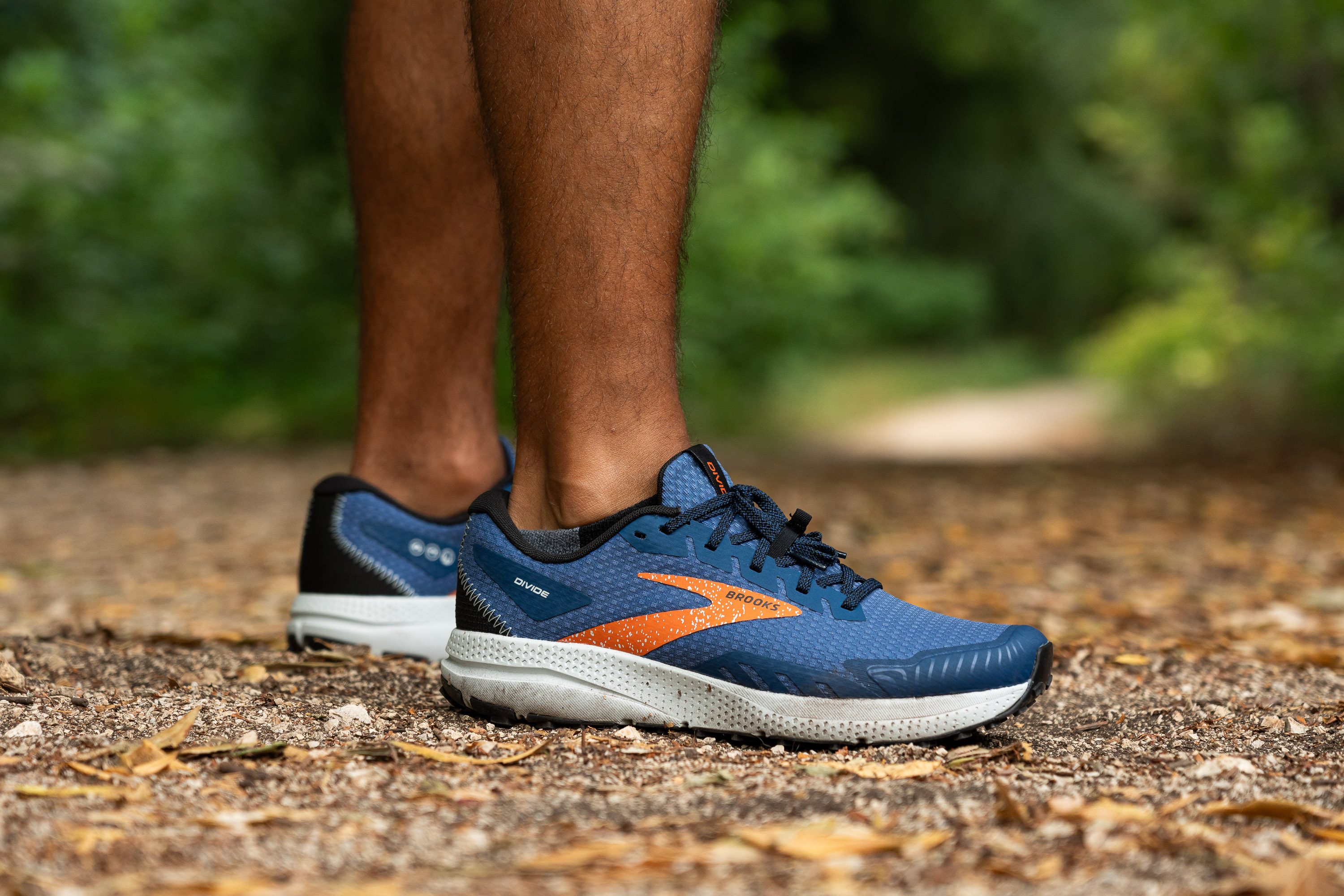
Who should NOT buy
Runners who frequent more rugged trails will benefit from a more aggressive shoe like the Brooks Cascadia 17 or the New Balance Fresh Foam X More Trail v3.
However, we recommend the more premium and less budget-friendly Nike Pegasus Trail 4 to more advanced runners looking for a bouncy and energetic midsole.
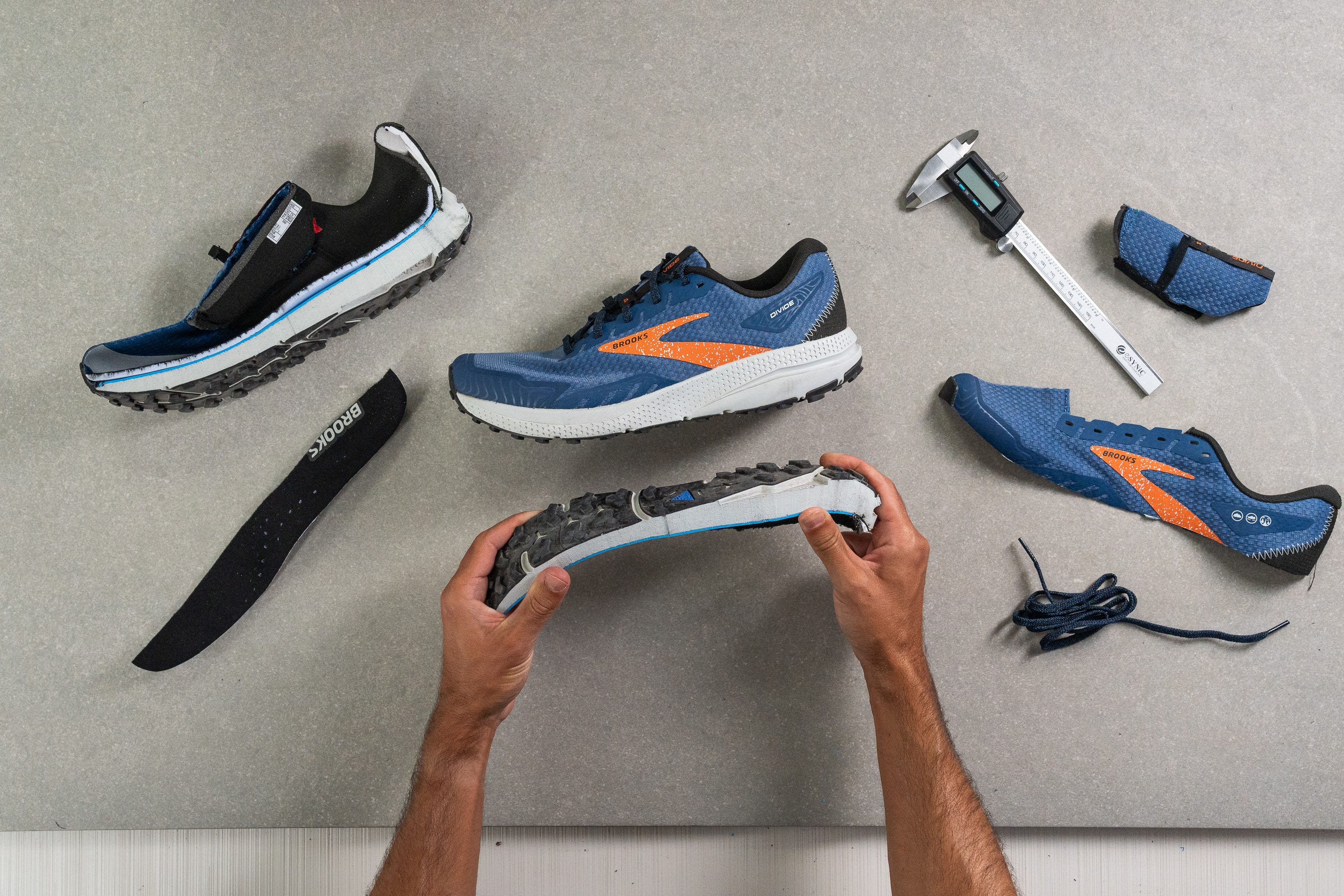
Cushioning
Heel stack
The Divide 4 boasts a 32.1 mm heel stack according to our caliper measurements. This is ever-so slightly higher than our current lab average and means that heel strikers have more than enough foam underfoot for well protected landings over even the harshest terrains.
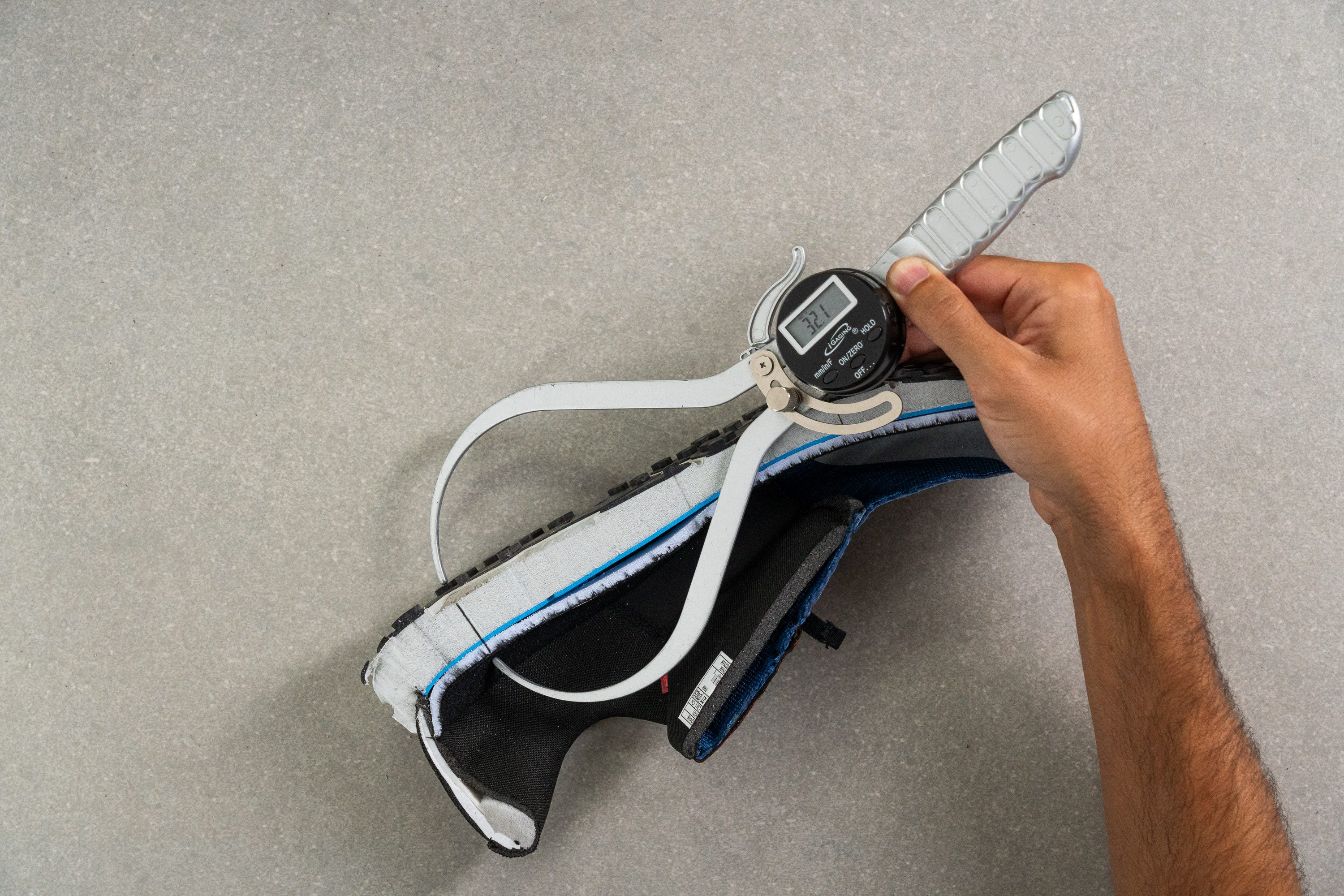
| Divide 4 | 32.1 mm |
| Average | 32.6 mm |
Forefoot stack
At 22.9 mm according to our caliper measurements, the Divide 4’s forefoot stack is a little shorter than our current lab average. This is still enough foam for forefoot strikers to feel amply protected during landings.
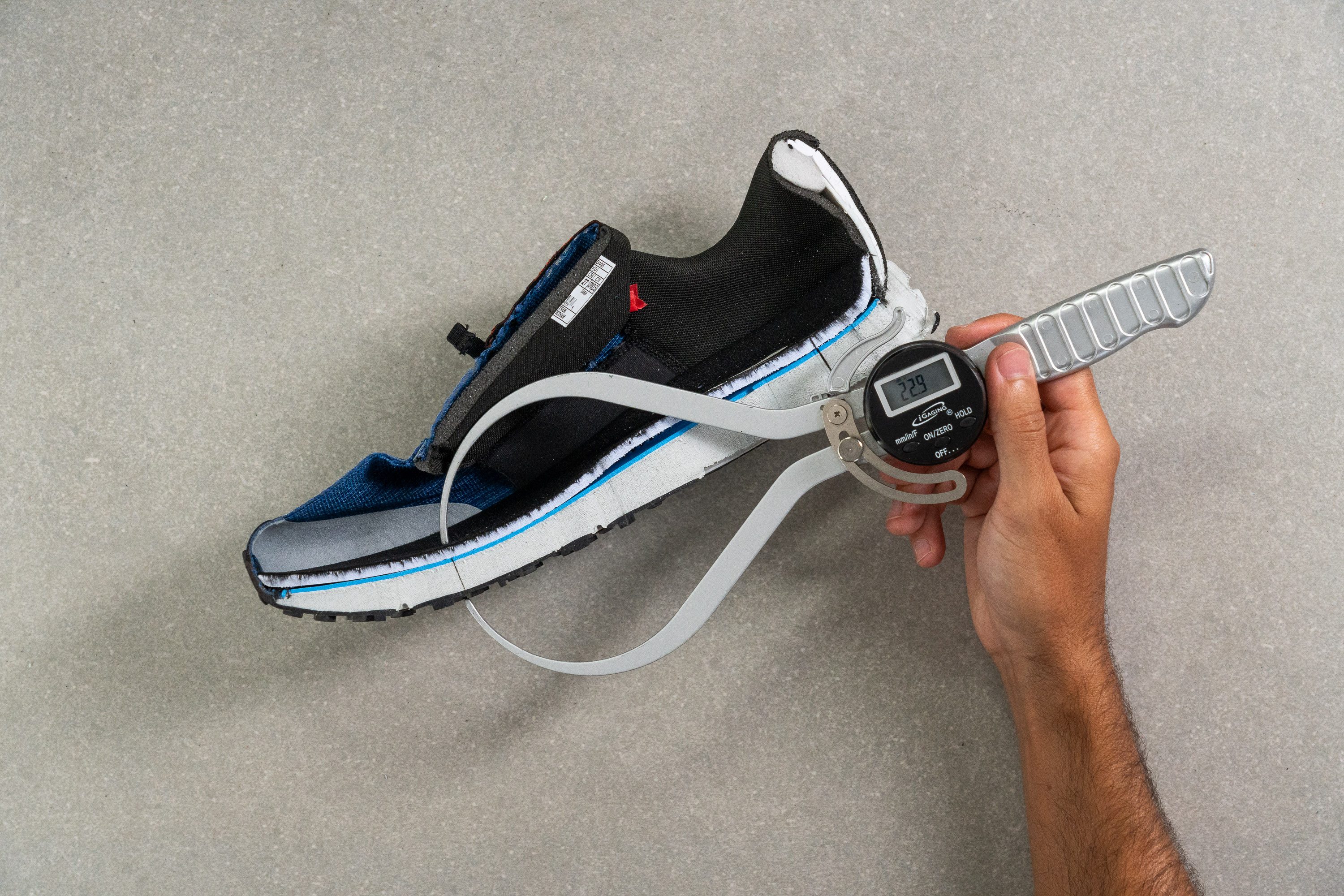
| Divide 4 | 22.9 mm |
| Average | 25.1 mm |
Drop
The difference in our stack measurements leaves us with a drop height of 9.2 mm, which is a little higher than the 8 mm officially stated by Brooks. This high drop is beneficial for beginner runners as it promotes smoother transitions when heel striking.
On the other hand, trail shoes tend to have mid or low drops as their more natural underfoot sensation promotes increased proprioceptive awareness which make traversing tricky terrains feel more intuitive.
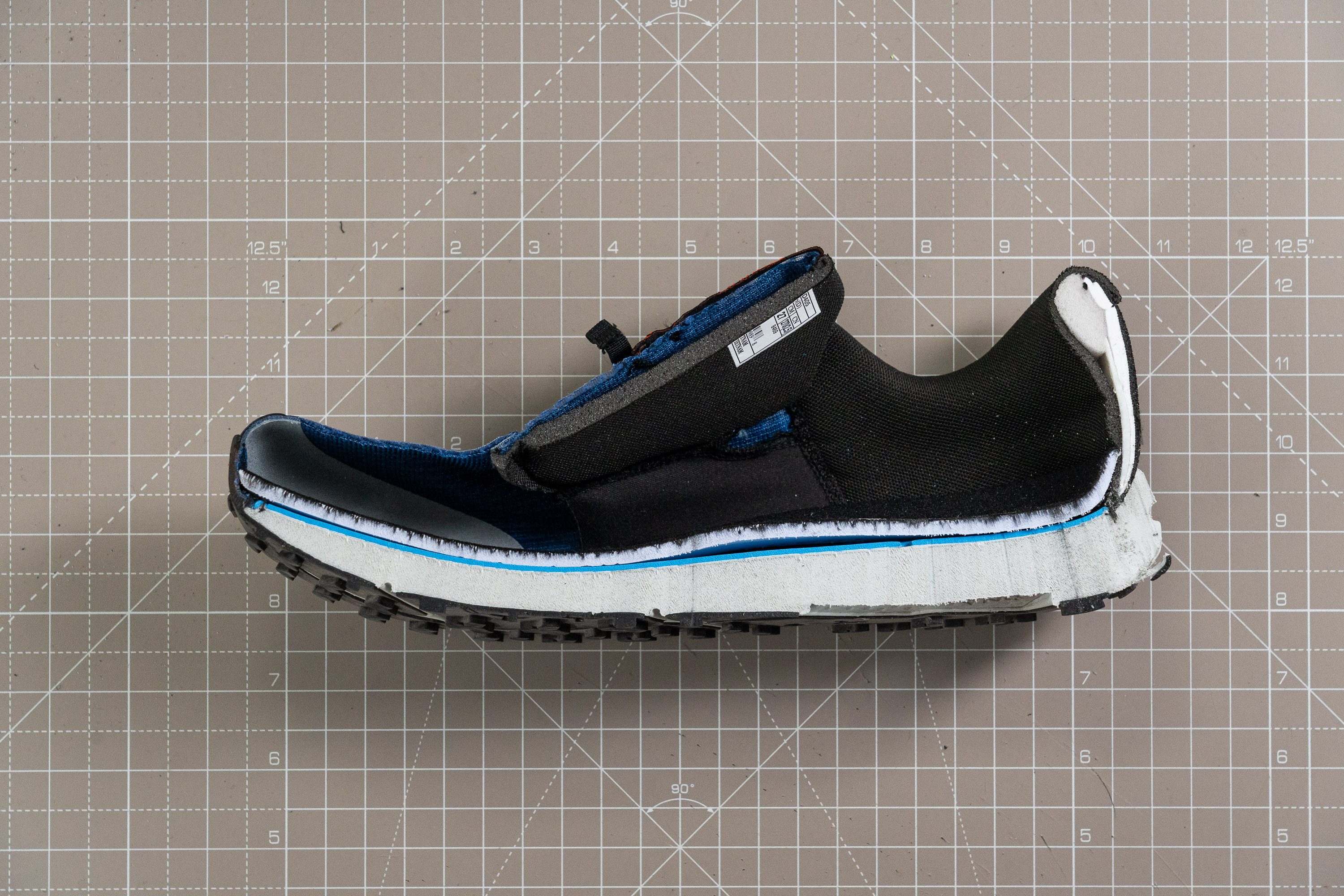
| Divide 4 | 9.2 mm |
| Average | 7.6 mm |
Midsole softness
We used our durometer to test the softness of the midsole and got a reading of 23.3 HA. While this is softer than our current lab average for trail shoes, we wouldn’t describe the Divide 4 as plush. Rather the shoe provides a balanced level of cushioning that's still a little on the firmer side and had us feeling well protected and stable during our test runs.
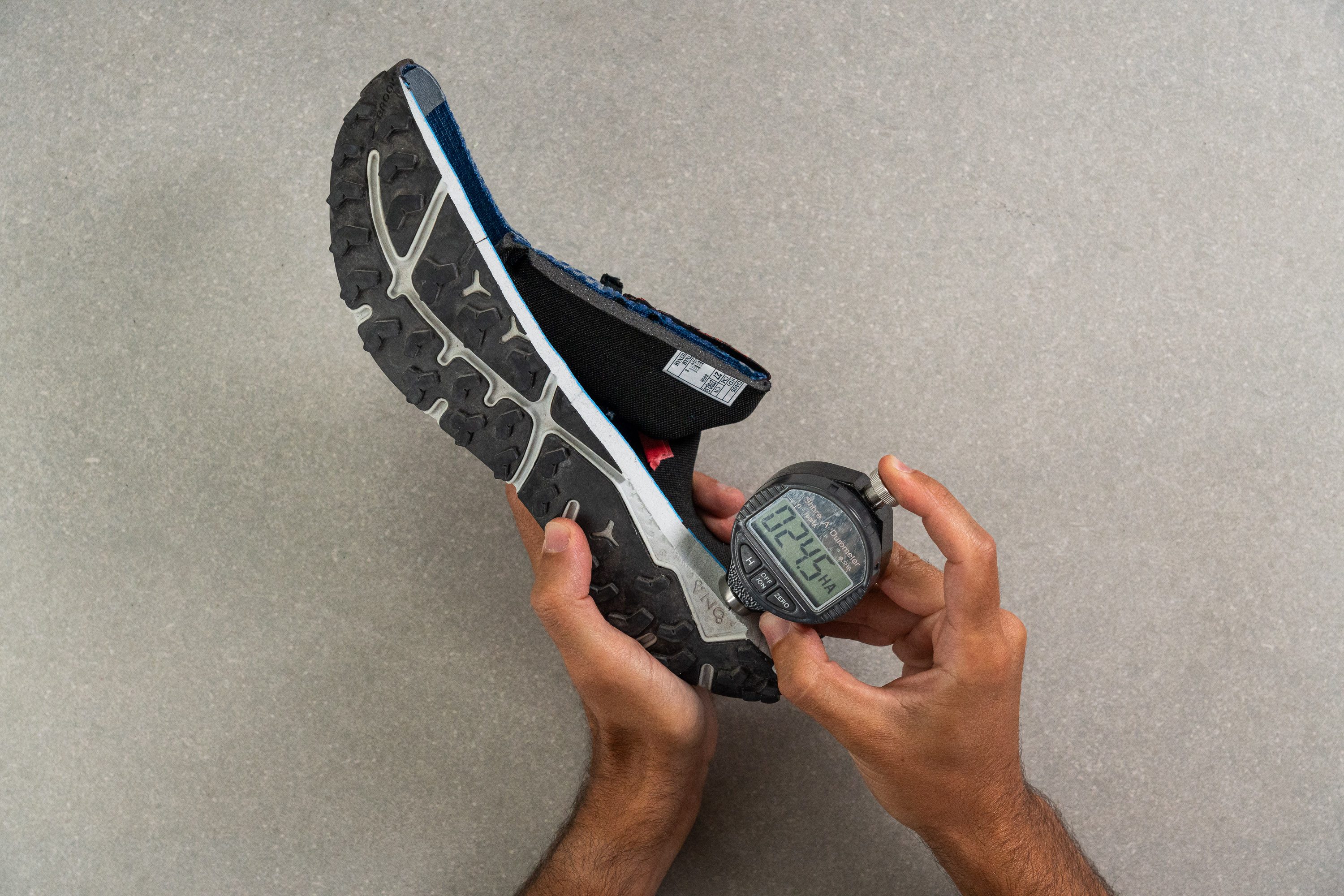
| Divide 4 | 23.3 HA |
| Average | 22.0 HA |
Size and fit
Size
Brooks Divide 4 fits true to size (19 votes).
Internal length
| Divide 4 | 266.6 mm |
| Average | 269.0 mm |
Width / Fit
Using our caliper we measured the Divide 4’s toebox at its widest point to be 100.3 mm wide. This is slightly wider than the average shoe and means that the Divide 4 should accommodate most foot shapes with ease.
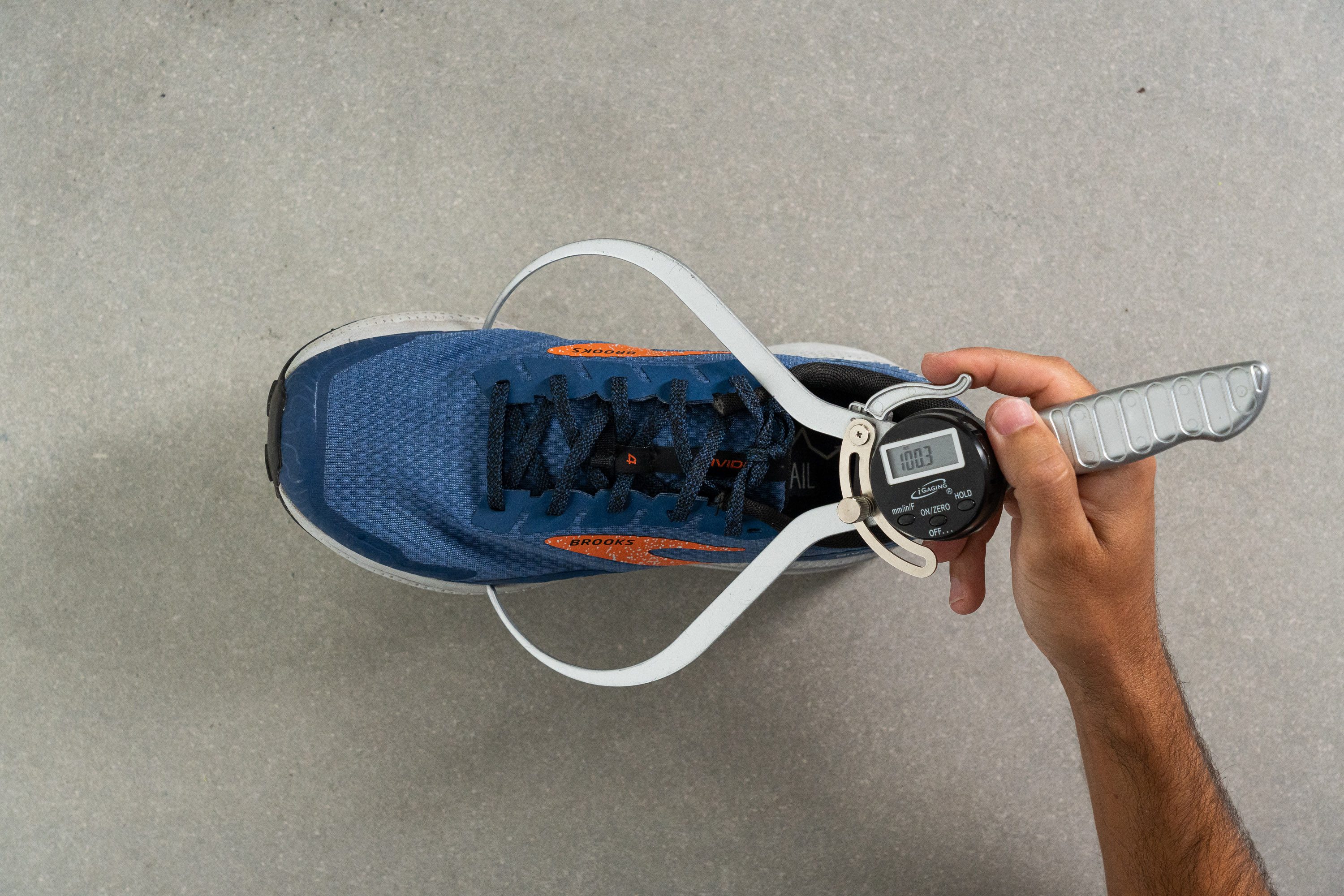
This test follows an older methodology, which is why you don't see recently tested shoes in the chart. Results from different methodologies can not be compared.
| Divide 4 | 100.3 mm |
| Average | 98.9 mm |
Toebox width
Moving up to the area around the big toe, we measured the Divide 4’s midsole to be 79.7 mm wide. This is quite a bit wider than average and means that there is plenty of room for natural splaying within the shoe with little risk of hotspots, even for runners with wide feet.
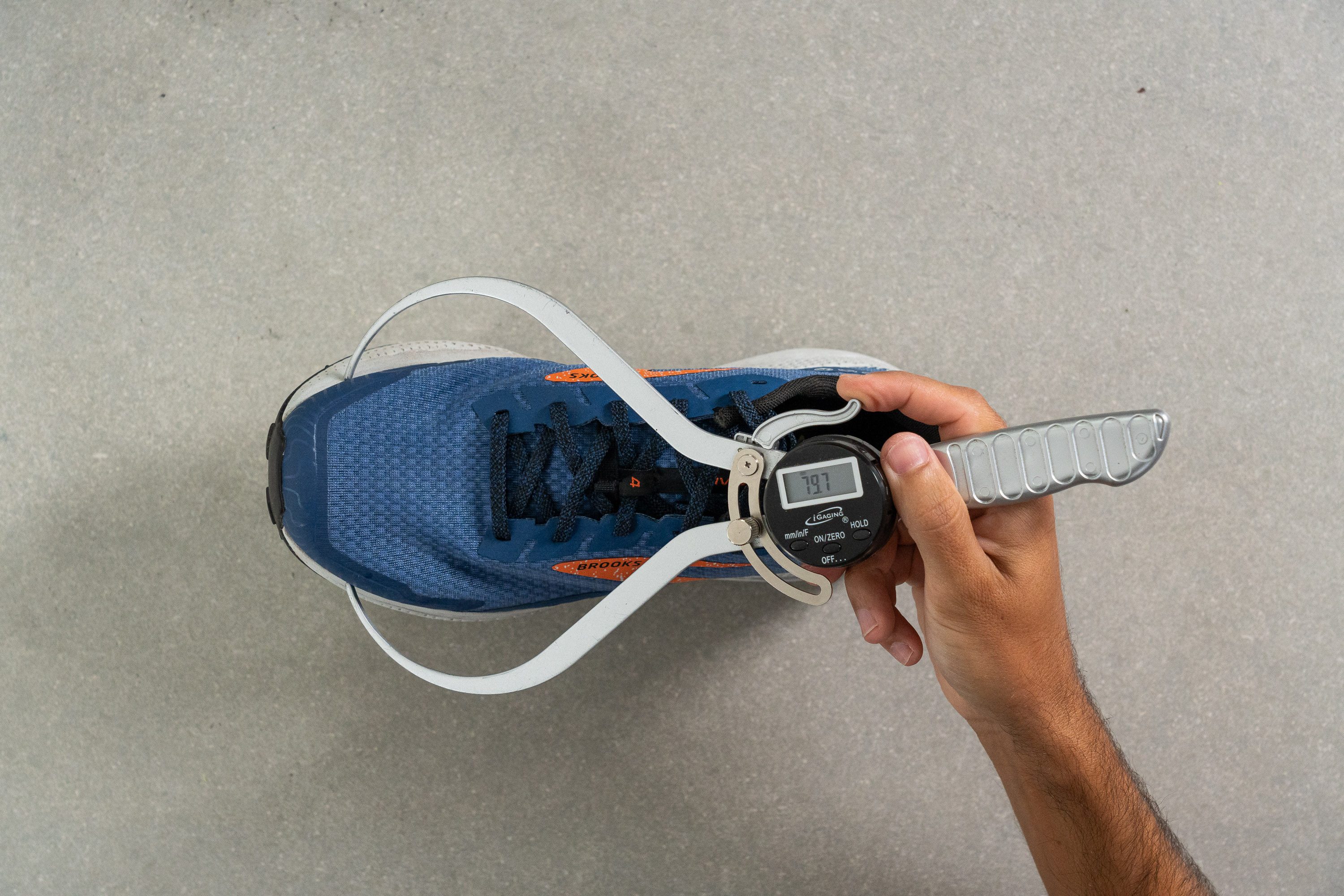
This test follows an older methodology, which is why you don't see recently tested shoes in the chart. Results from different methodologies can not be compared.
| Divide 4 | 79.7 mm |
| Average | 79.3 mm |
Traction / Grip
Lug depth
The lugs on the Divide 4 are 2.7 mm thick, according to our calliper measurements, which is a much more subtle lug configuration than the average trail shoe.
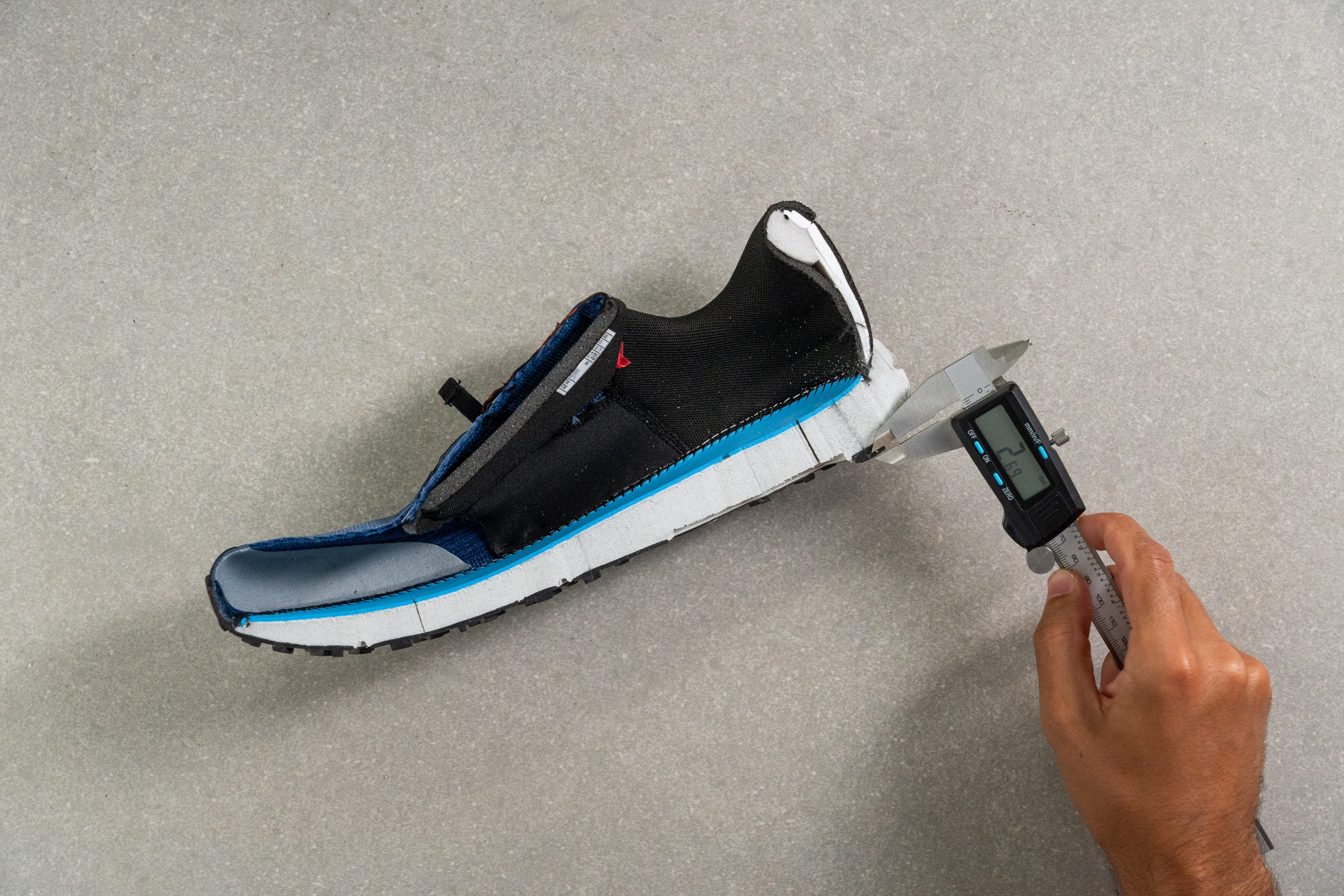
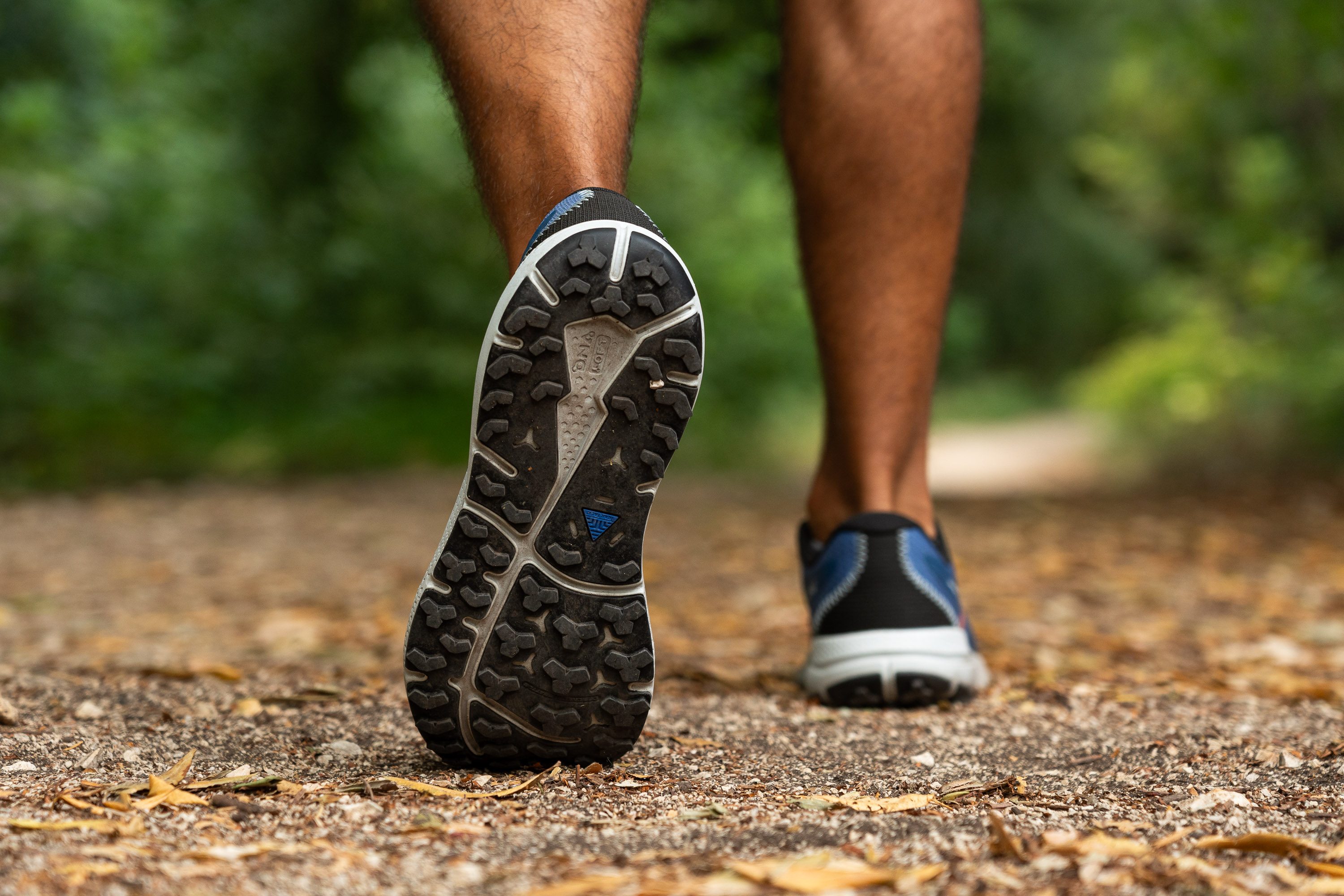
On the one hand, this means the shoe is well-adapted as a road-to-trail shoe as it provides good traction and doesn’t feel too blocky on asphalt. On the other hand, however, it means that the shoe falls flat on more technical trails with lots of rocks and gravel and loose dirt, and is more well-suited for mild trails or park runs.
For a road-to-trail shoe with a more aggressive lug configuration; we recommend looking at the Nike Terra Kiger 9 instead, while runners looking for a shoe that’s more of a rugged mudder should check out the New Balance Fresh Foam X More Trail v3. It has to be said that the Divide 4 has both beat on price though.
| Divide 4 | 2.7 mm |
| Average | 3.5 mm |
Flexibility / Stiffness
We measured how much force is needed to bend the shoe 90-degrees to test the Divide 4’s stiffness and got a reading of 21.55N. This is much more flexible than the average trail shoe which contributes greatly to the Divide 4’s comfortable ride. It also means that the shoe feels quite noble as it easily bends and shifts with the natural movement of the foot during our stride.
This test follows an older methodology, which is why you don't see recently tested shoes in the chart. Results from different methodologies can not be compared.
| Divide 4 | 21.6N |
| Average | 27.1N |
Stiffness in cold (%)
We repeated the stiffness test after leaving the Divide 4 in the freezer for twenty minutes to see how the shoe reacts to the cold. With a result of 28.5N of force required to bend the shoe 90 degrees, not only is the Divide 4 more flexible than the average trail shoe under similar conditions but at room temperature too! This means that the Divide 4 should still feel comfy and agile during frosty winter runs.
Stiffening up by only 32.3%, the flexibility of the Divide 4 is much less susceptible to changes in temperature than the average trail shoe. For a better understanding of the effects of cold weather on running shoes, check out our handy guide on the subject.
| Divide 4 | 32% |
| Average | 32% |
Weight
Tipping the scale at an even 10 Oz (282g) means that the Divide 4 isn’t just lighter than the average trail shoe, but strangely also 0.5 Oz (14.1g) lighter than advertised by Brooks! This meant that we didn't feel burdened by the Divide 4 when pushing the pace or testing our endurance with longer runs.
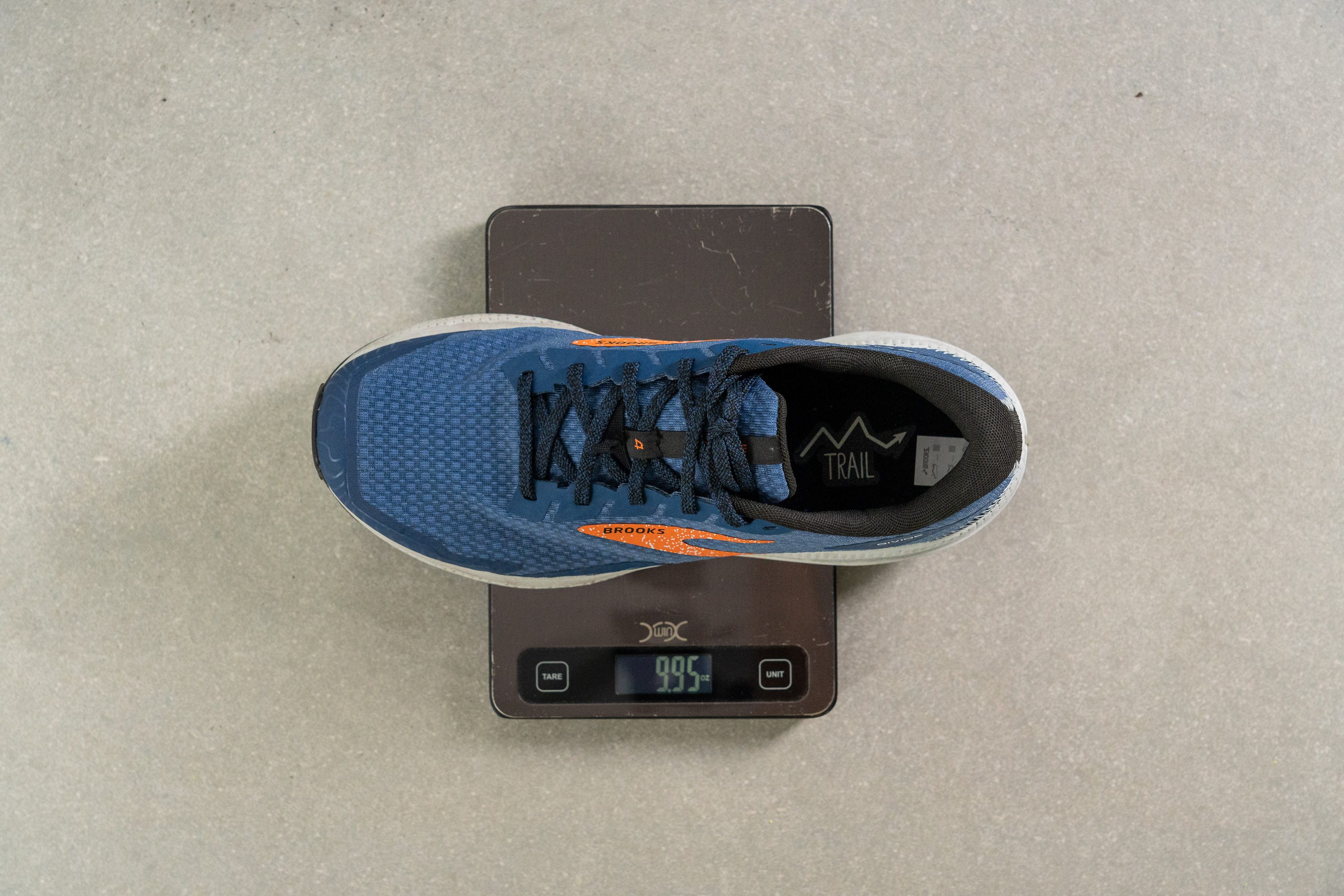
| Divide 4 | 9.9 oz (282g) |
| Average | 10.2 oz (289g) |
Breathability
To test the airflow of the shoe, we pumped the Divide 4 full of smoke to observe how easily it vents. As demonstrated by our video, smoke escapes almost immediately through the Divide 4; especially through the well-perforated tongue which steadily chugs out smoke like a chimney. The rest of the shoe, however, releases the smoke slowly in thin wisps which tells us that the medial air flow isn’t as great. On balance the Divide 4’s above average performance in this test earns it a score of 4 out of 5 for breathability.
Looking at a backlit cross section of the Divide 4, we can see how the light shines through the perforations found on the front and top areas of the shoe, while the reinforced sides block it out entirely. This helps to explain the shoe’s less-than-stellar ventilation in those areas. Though as heat tends to flow upwards, the shoe shouldn’t feel like running in a toaster on hot summer days.
Our closeup shots of the Divide 4’s upper show that while it’s pretty densely woven, there are still plenty of air pockets between the braids to facilitate a fair amount of airflow throughout the shoe.
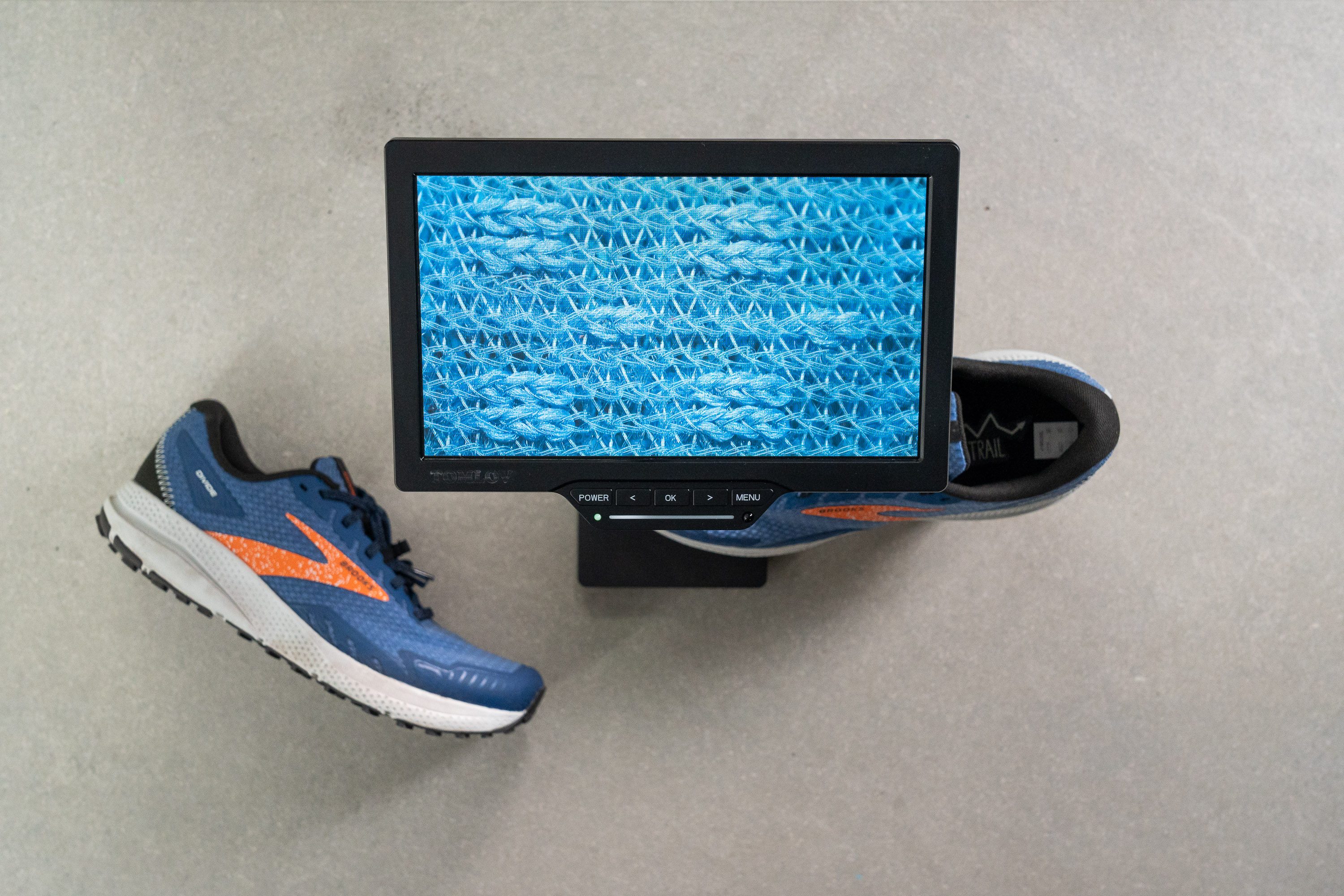
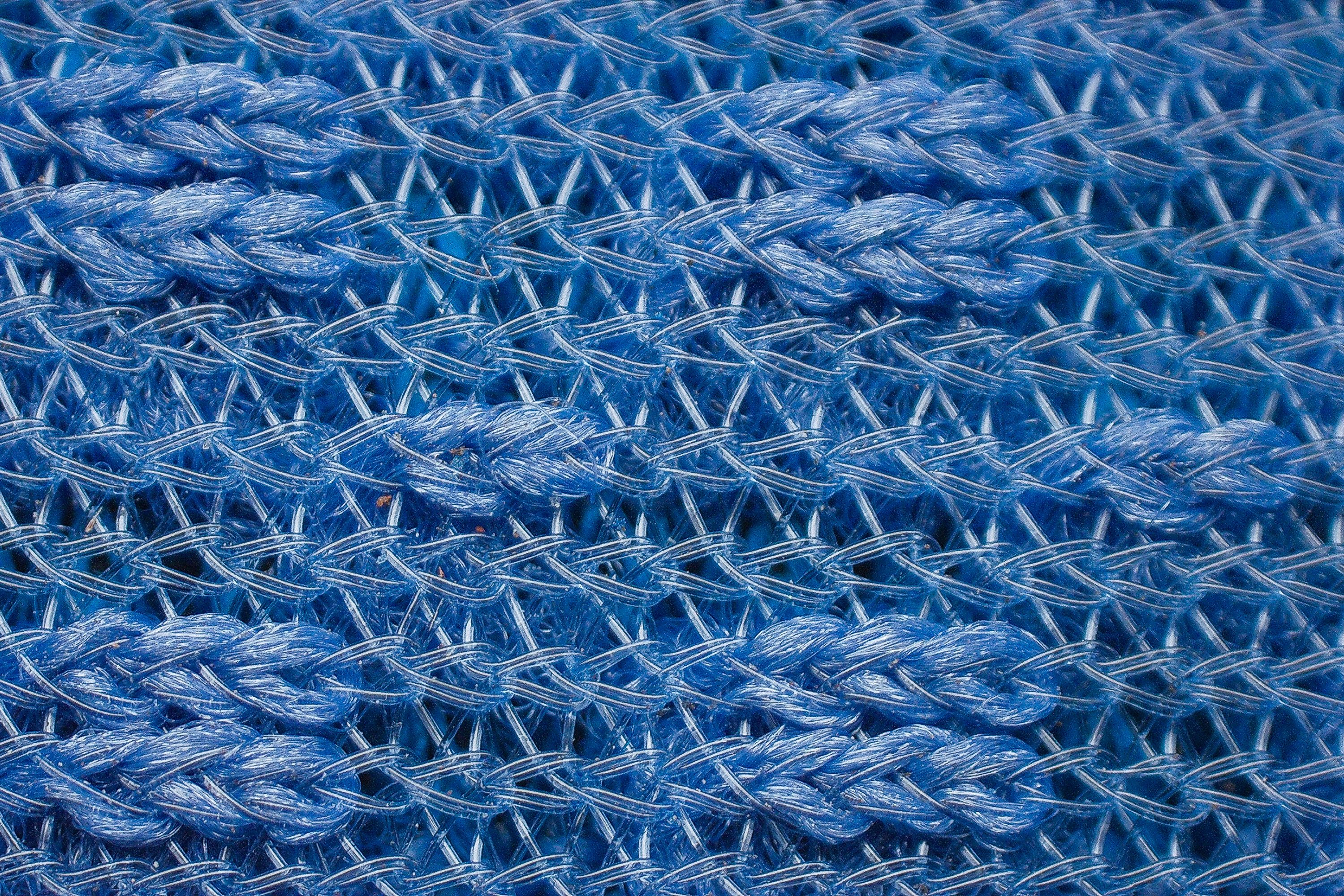
| Divide 4 | 4 |
| Average | 3.3 |
Stability
Lateral stability test
Despite its healthy heel stack and relatively steep drop, the Divide 4 felt pretty well planted when we shifted our weight from side to side in the shoe. This sure-footed and stable feeling continued during our runs even when cornering on uneven terrain.
Torsional rigidity
The Divide 4 put up a fair amount of resistance as we bent and twisted the shoe in our hands, leading us to give it a score of 3 out of 5 on our subjective scale for torsional rigidity. This level of stiffness provides us with a good balance of comfort and stability as the shoe does allow for some natural foot flexion while preventing excessive rolling.
| Divide 4 | 3 |
| Average | 3.6 |
Heel counter stiffness
The Divide 4’s heel counter is quite stiff as we were barely able to manipulate it in our hands, earning it a score of 4 out of 5 on our subjective scale. This level of stiffness means that the shoe does a good job holding the heel in place, preventing too much lateral movement that can cause instability.
At the same time, the heel cup’s rounded shape and generous padding means that we didn’t feel the shoe pinching at our Achilles tendons. Rather the Divide 4 pleasantly squeezes the foot in place and provides us with great rearfoot lockdown that mitigates heel rubs.
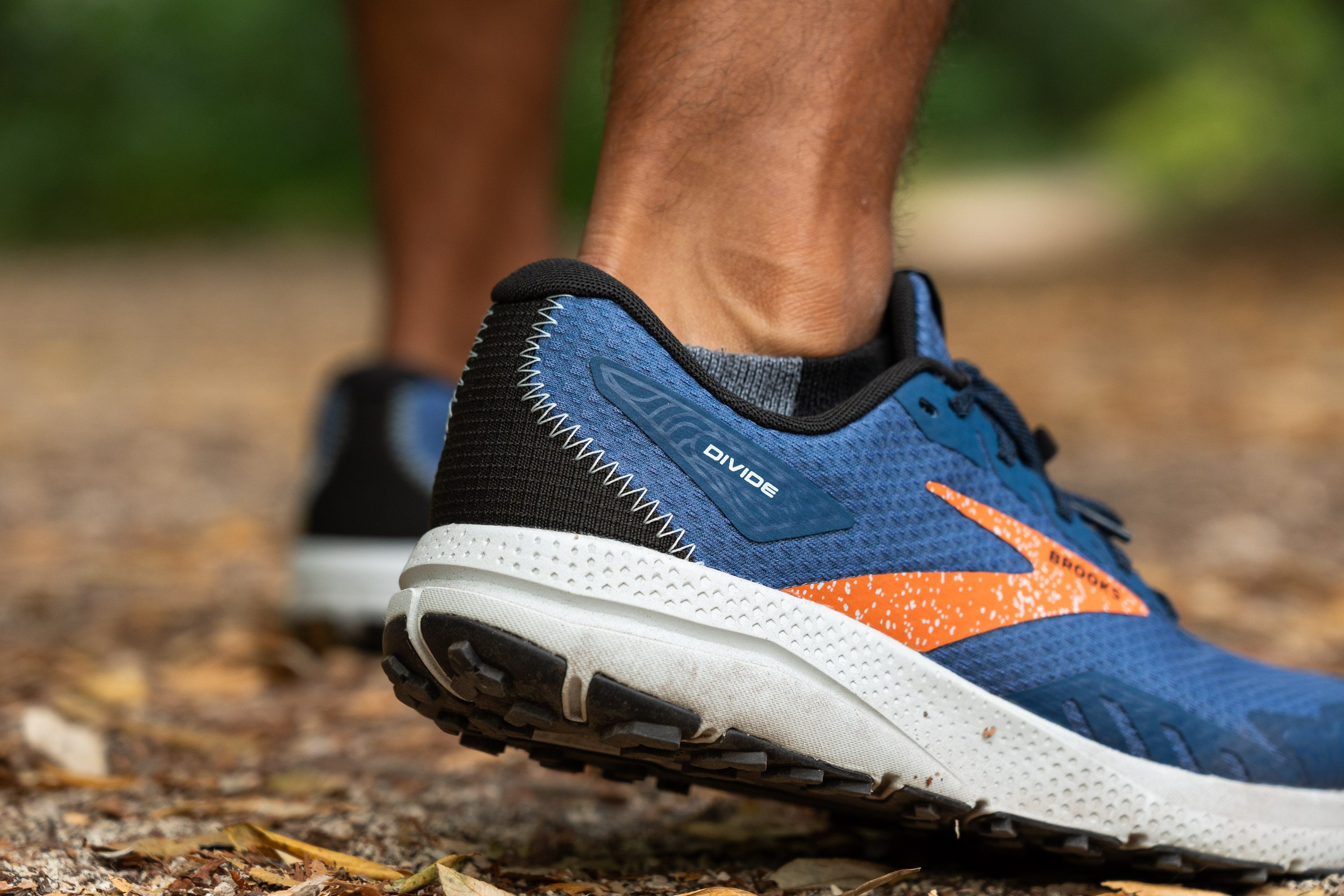
| Divide 4 | 4 |
| Average | 3 |
Midsole width - forefoot
At 113.7 mm wide according to our caliper measurement, the Divide 4’s midsole is wider than the average shoe which provides us with a solid platform for stable landing and toe-offs without feeling overly blocky when taking corners.
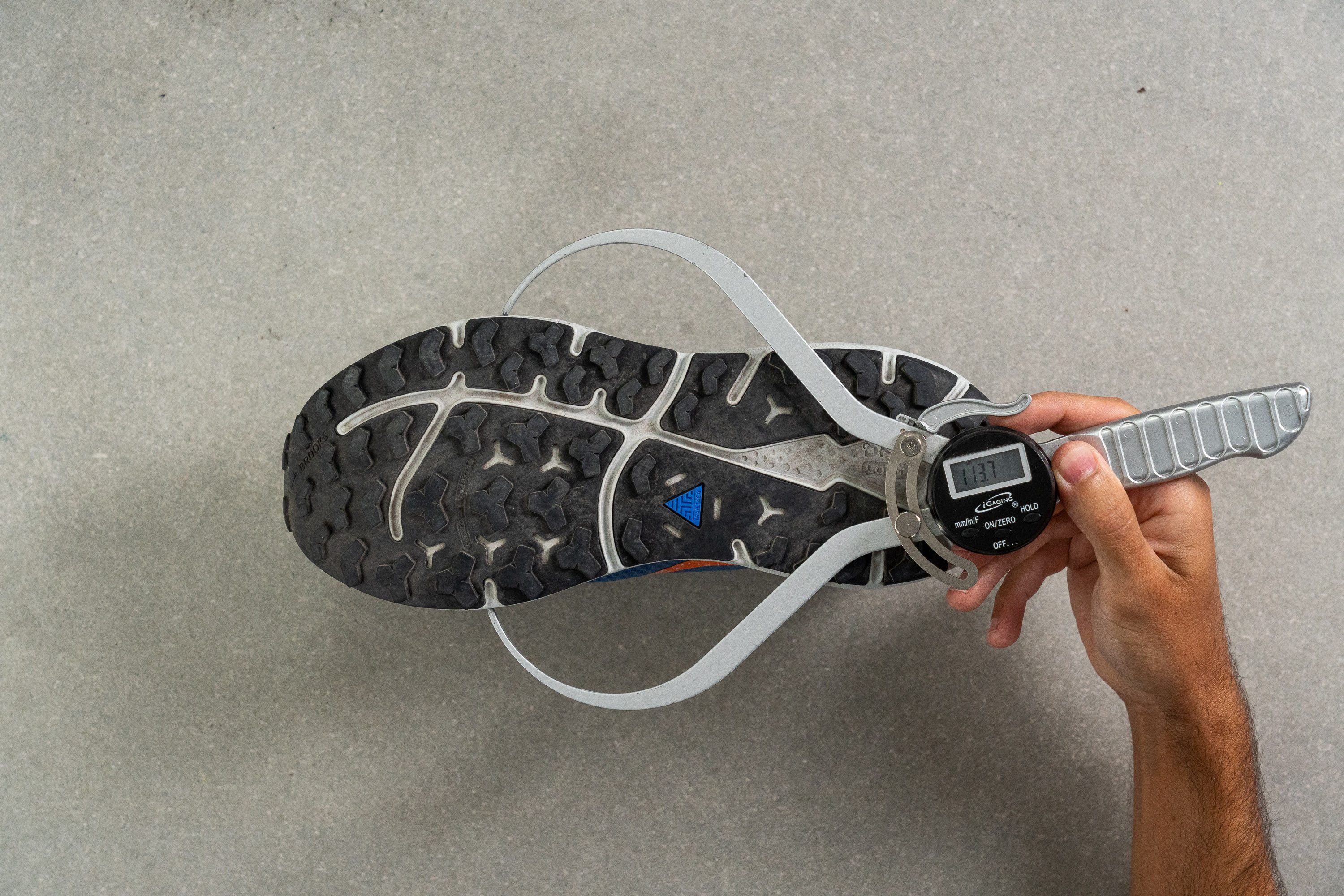
| Divide 4 | 113.7 mm |
| Average | 112.8 mm |
Midsole width - heel
At 96.7 mm, the Divide 4’s midsole is significantly more robust than the average trail shoe at the heel. This means that we have plenty of platform underfoot to ensure stable landings when heel striking.
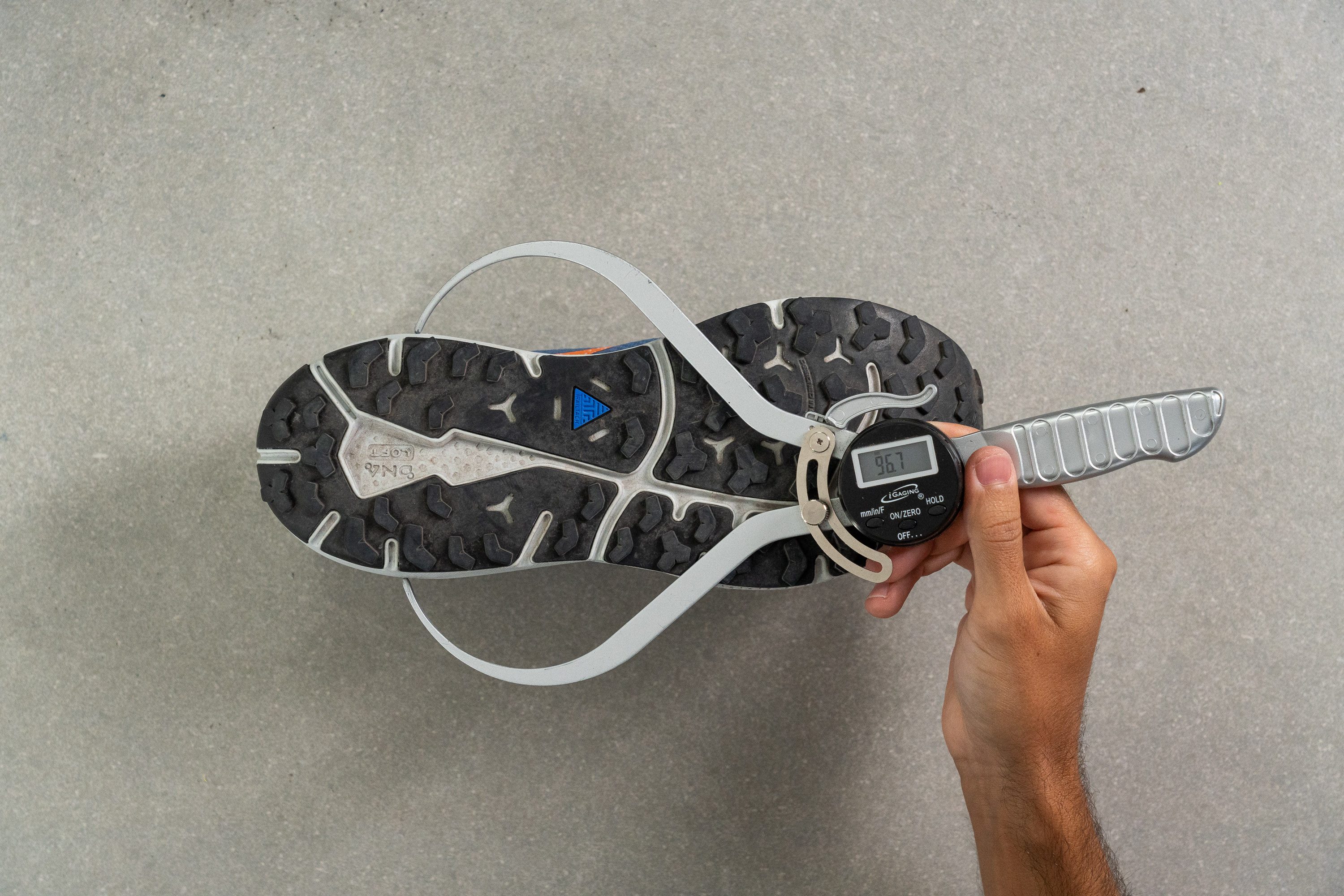
| Divide 4 | 96.7 mm |
| Average | 89.9 mm |
Durability
Toebox durability
We used our dremel to test the durability of the Divide 4’s toebox by applying it to the shoe at 5K RPM with a force of 3.2N for four seconds. The tool’s grinding element quickly bit into the unreinforced section of the toebox and started shredding away at the material.
Although we had punctured clear through the toebox by the end of the test, to our surprise, the hole we uncovered wasn’t as large as we expected with only a fraction of the contact area failing catastrophically. This is still less durable than we would like, especially from a trail shoe, thus leading us to give the Divide 4 a toebox durability score of 2 out of 5.
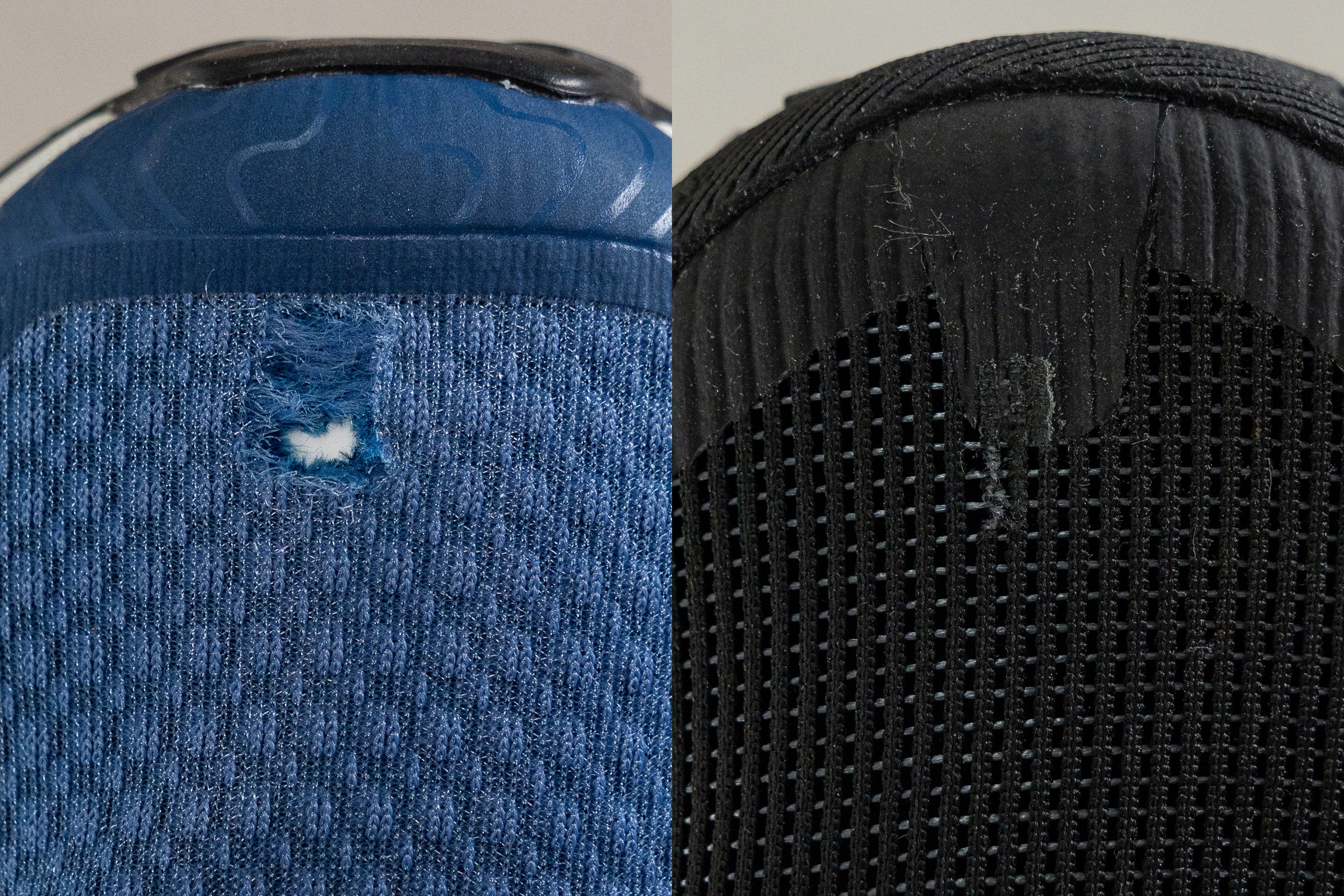
For a shoe with a much hardier toebox; have a look at how the Nike Terra Kiger 9 performed in the same test, earning a perfect 5 out of 5.
| Divide 4 | 2 |
| Average | 3.1 |
Heel padding durability
Applying our dremel with the same parameters to the Divide 4’s heel counter, the tool eased its way through the padding like a hot knife through butter. Once the four second test was over, we were left with a crater that went clean through the shoe’s lining and most of the padding, earning the Divide 4 a score of 1 out of 5 for heel padding durability.
While this shouldn’t be surprising for a shoe at this price-point, we still don’t recommend going sockless in the Divide 4 as the friction from constant heel rubs will likely shorten the shoe’s lifespan.
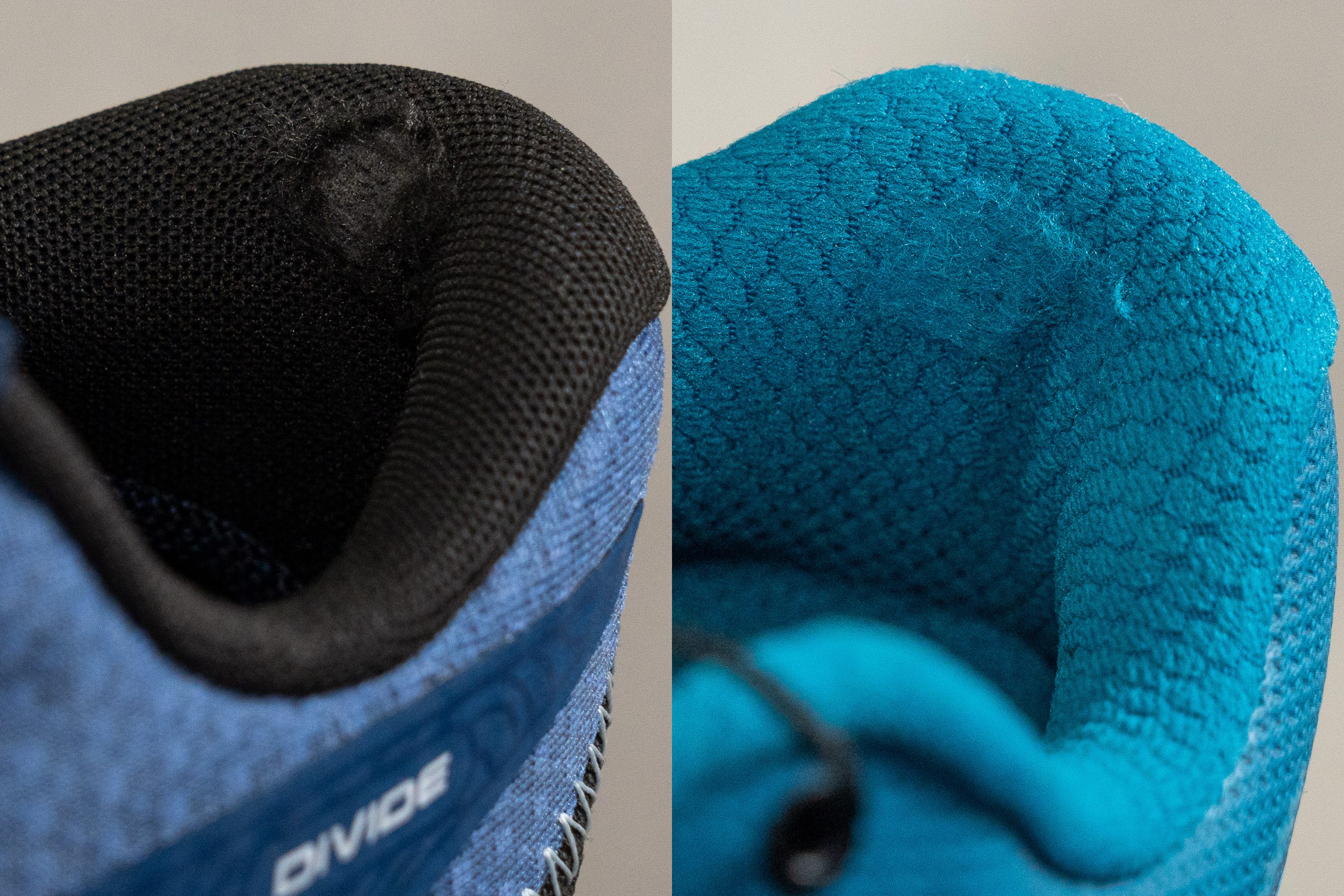
For comparison; look at how the much more durable Salomon Ultra Glide fared after the same test.
| Divide 4 | 1 |
| Average | 3 |
Outsole hardness
We used our durometer to measure how hard the Divide 4’s outsole is and got a reading 84.3 HC. This reading is marginally softer than our current lab average and is usually a good balance between grippiness and durability.
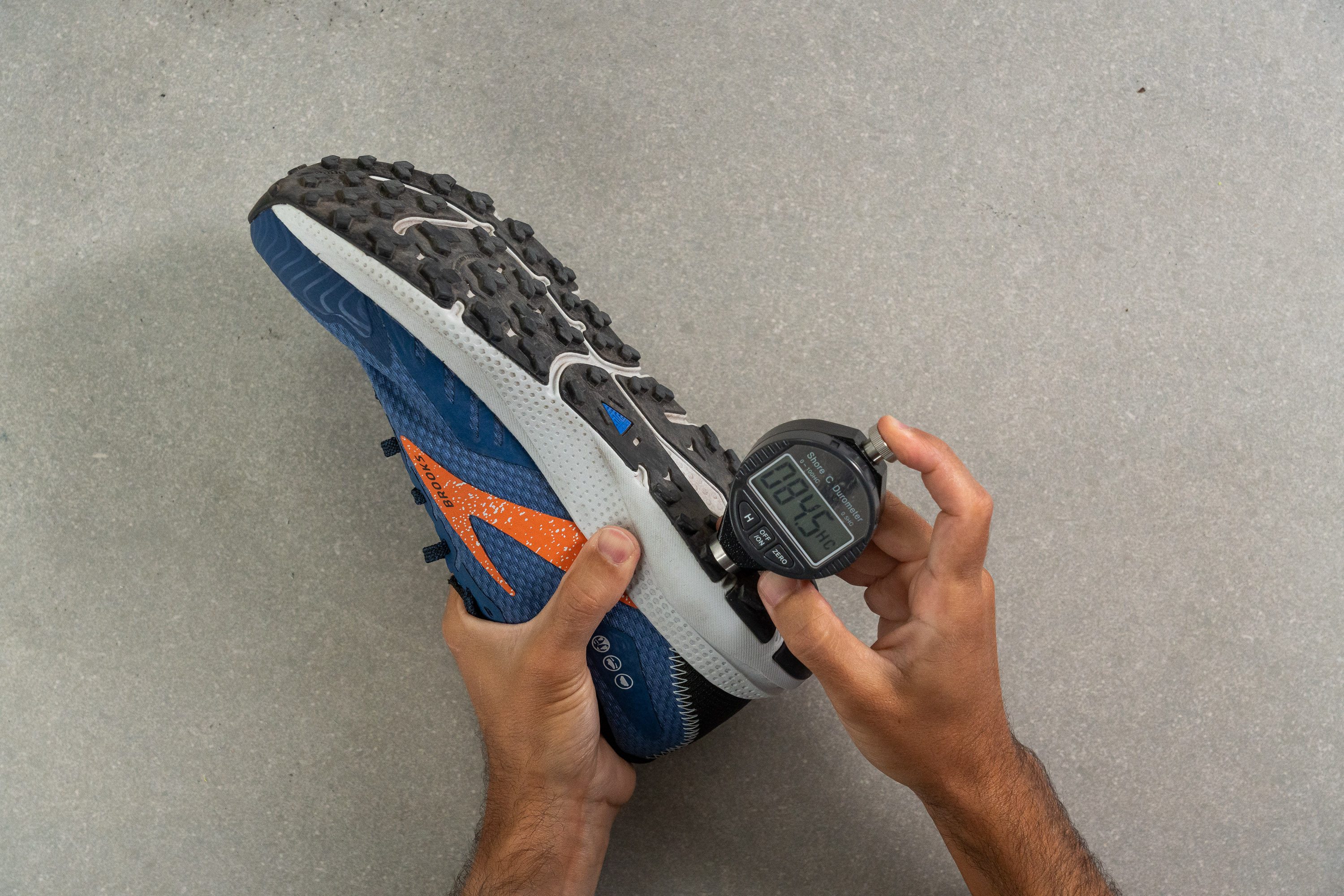
| Divide 4 | 84.3 HC |
| Average | 85.8 HC |
Outsole durability
We say usually as when we wielded our nearly undefeated dremel against the Divide 4’s outsole at 10K RPM with a force of 3.2N, we found that we had lopped off 1.2 mm of material by the end of the twenty second test. This means that the Divide 4’s outsole isn’t as durable as the average trail shoe which doesn’t shed as much material in comparison.
This means that we expect to see significant wear on the lugs 400 miles down the line, with the ones around impact zones likely worn down all the way down to the outsole.
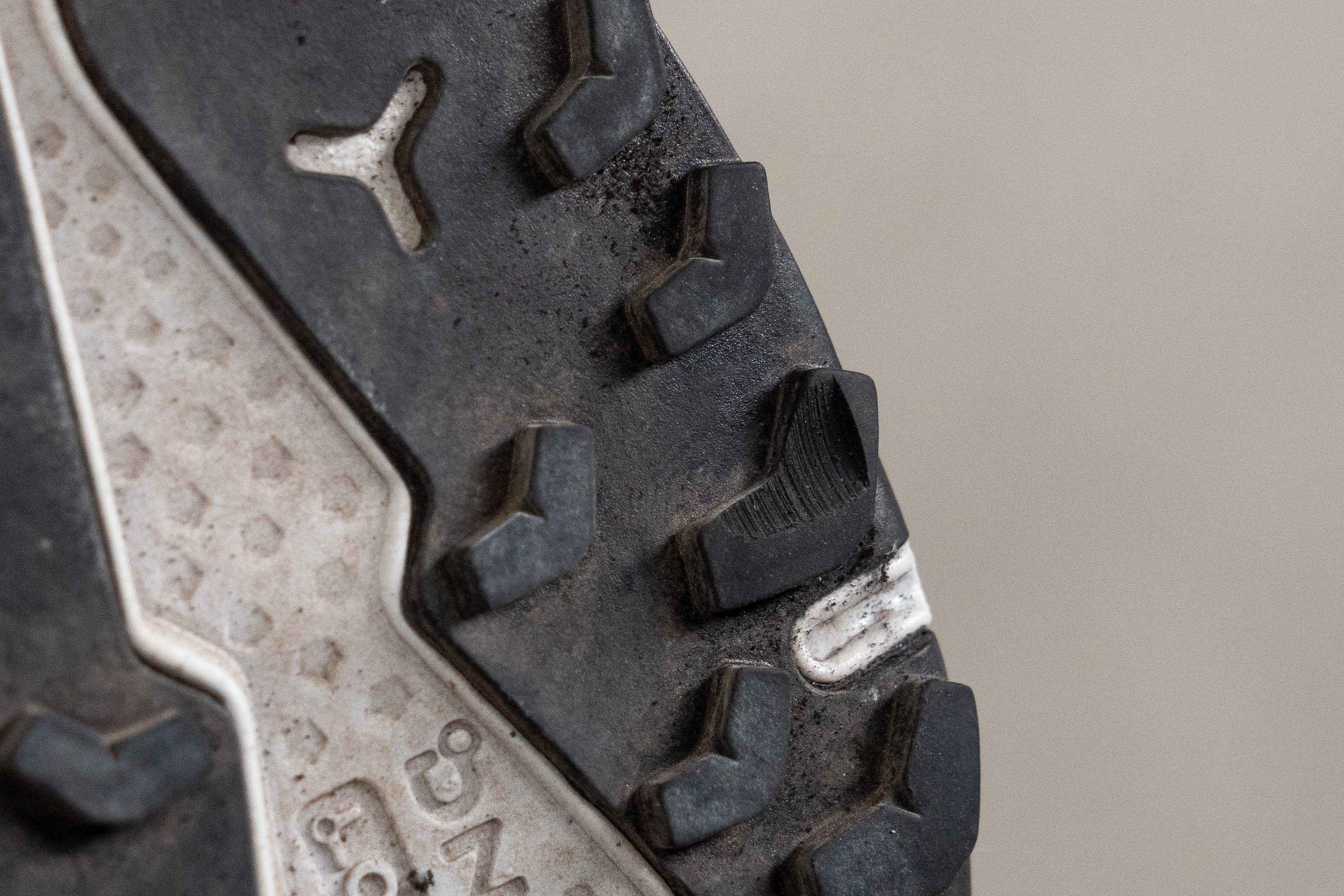
| Divide 4 | 1.2 mm |
| Average | 0.9 mm |
Outsole thickness
At only 1.7 mm according to our caliper, the Divide 4’s outsole is quite a bit thinner than the average trail shoe. Skimping on rubber does help keep weight off the shoe, but the result of our durability test means that we would be happier with a little more material underfoot to give the shoe a longer shelf life.
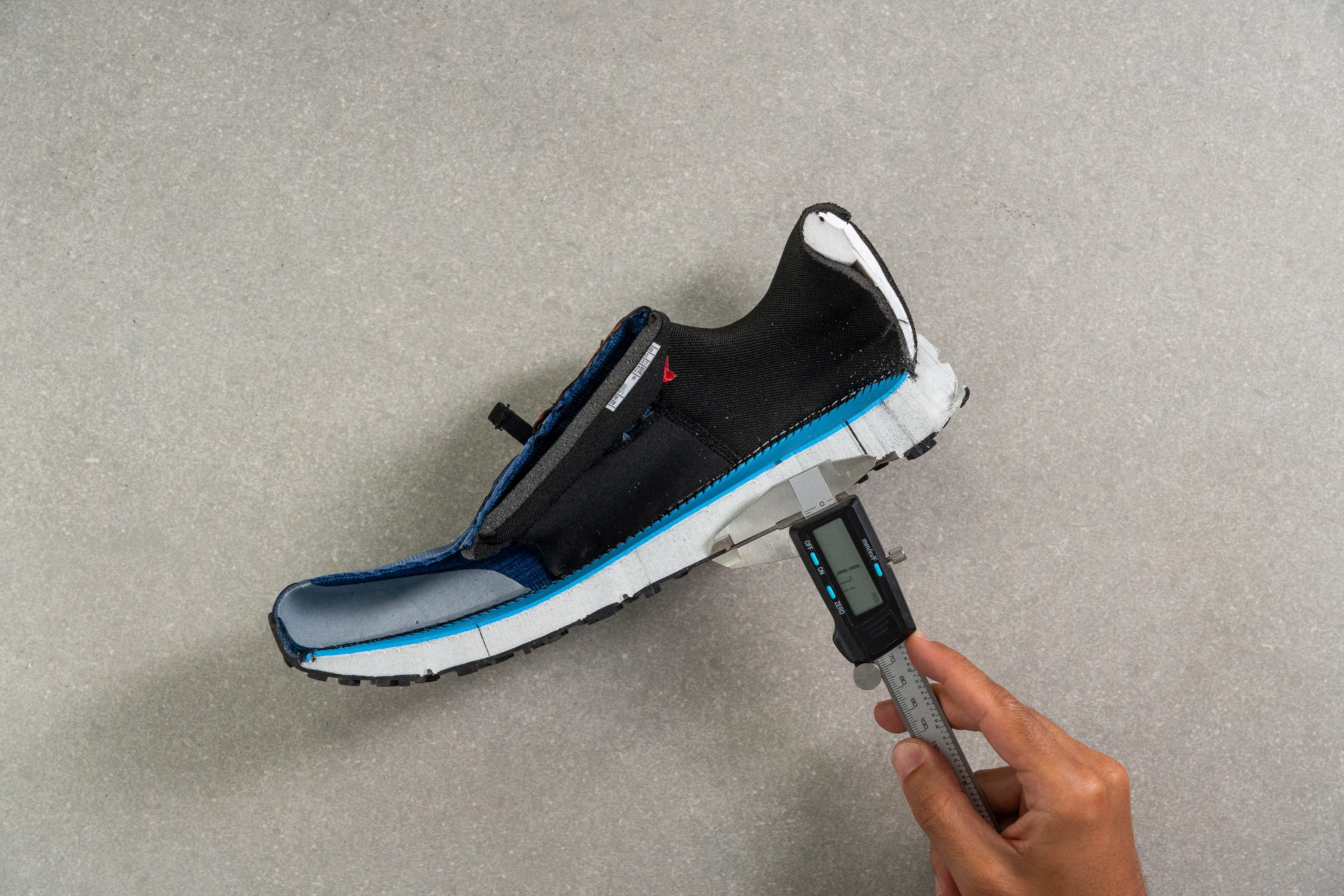
| Divide 4 | 1.7 mm |
| Average | 2.2 mm |
Misc
Insole thickness
The Divide 4’s insole is slightly thicker than average at 5 mm thick according to our caliper. This provides us with a nice complement to the shoe’s midsole cushioning that contributes to the shoe’s overall comfort, even when putting in serious miles.
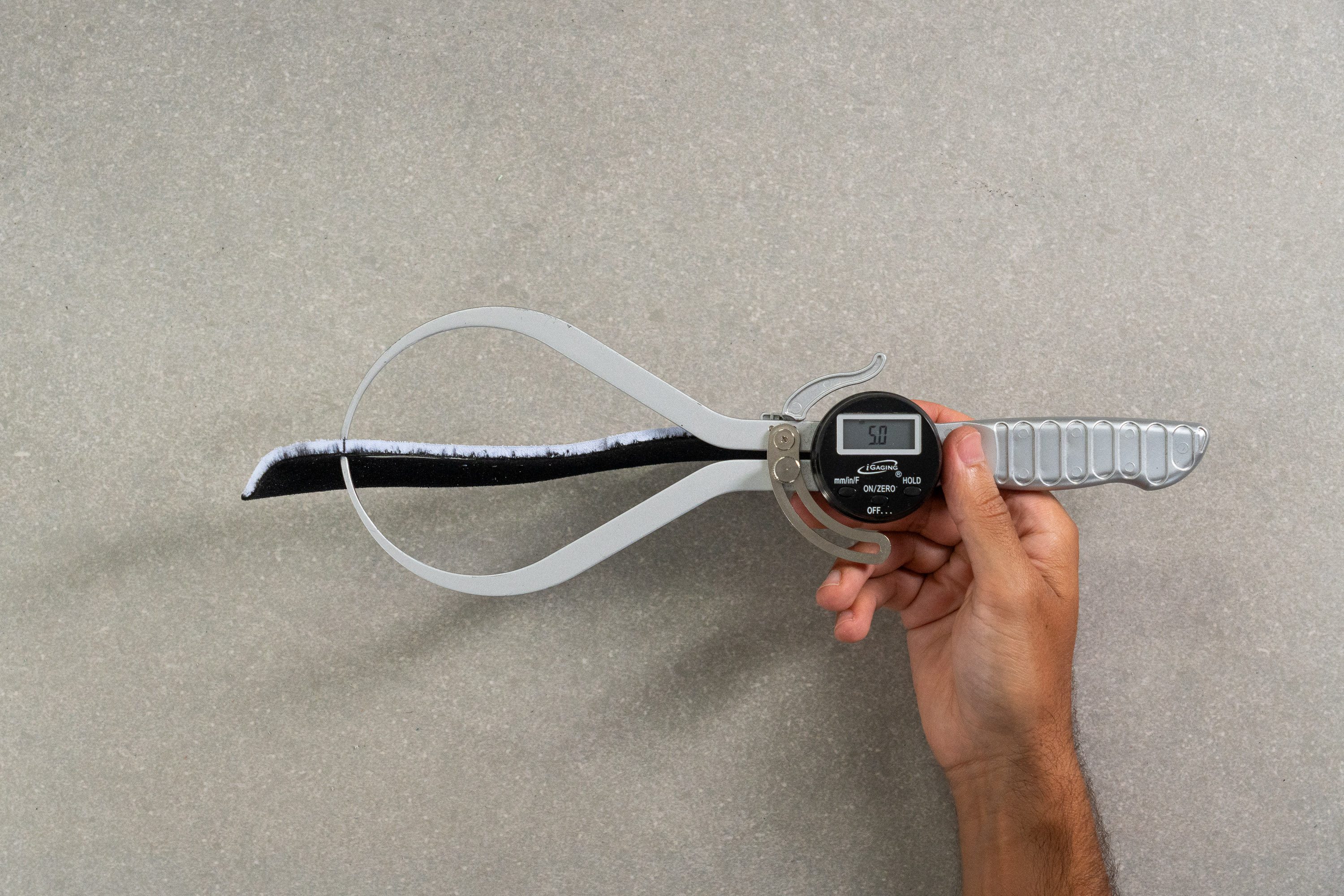
| Divide 4 | 5.0 mm |
| Average | 4.7 mm |
Removable insole
The insole of the Divide 4 is fully removable so custom orthotics can be used where necessary.
| Divide 4 | Yes |
Midsole softness in cold (%)
To test how the shoe’s midsole reacts to cold weather, we put the Divide 4 in the freezer for twenty minutes and took another durometer reading. At 33.3 HA, the Divide 4’s midsole is still slightly less firm than the average shoe under similar conditions. This means that while the Divide 4 stiffens up quite significantly, it will still provide an adequate level of cushioning even during the harshest winter runs.
With a 42.5% difference in the softness of the shoe’s midsole, the Divide 4 isn’t as consistent as the average shoe; with the shoe’s ride feeling noticeably different depending on the weather.
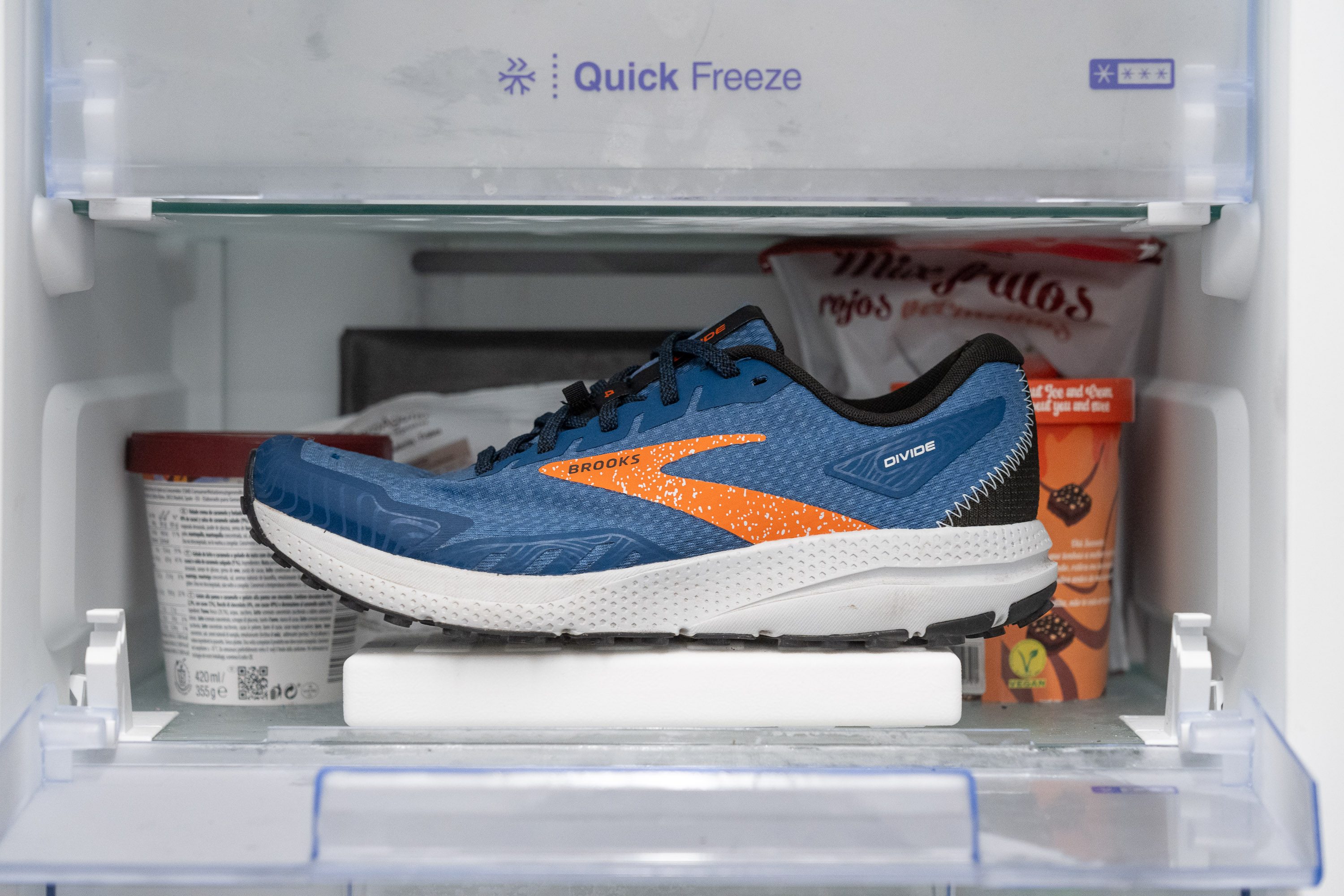
| Divide 4 | 43% |
| Average | 26% |
Reflective elements
With no reflective elements whatsoever to be found on the shoe, we recommend exercising caution and using some form of high-visibility gear when taking the Divide 4 out for a night run.
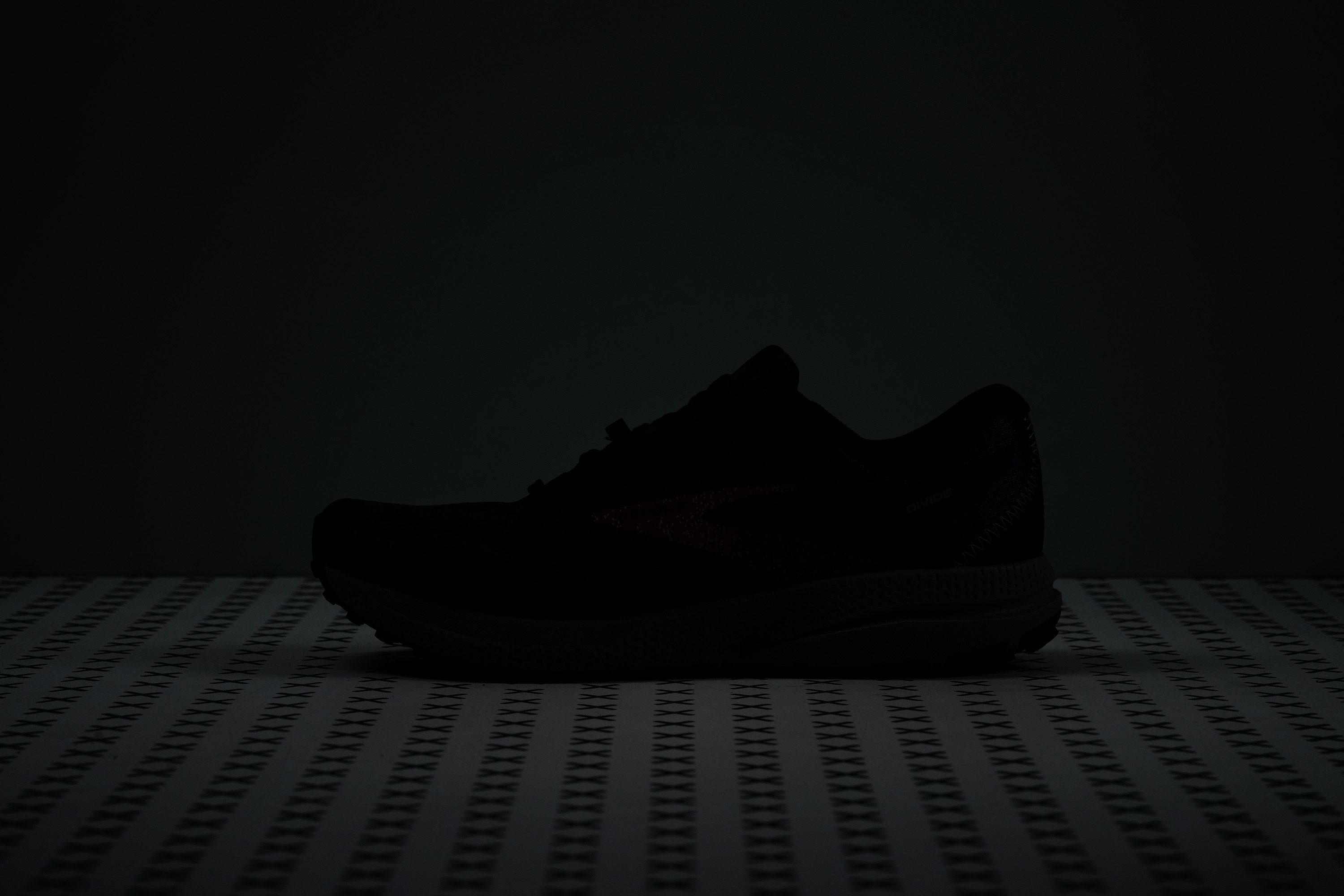
| Divide 4 | No |
Tongue padding
The Divide 4’s tongue is more plushly padded than the average shoe, measuring 8.3 mm thick according to our caliper. This not only provides us with great comfort around the instep, it also helps in achieving a comfy and secure midfoot lockdown without the specter of lace bite rearing its ugly head.
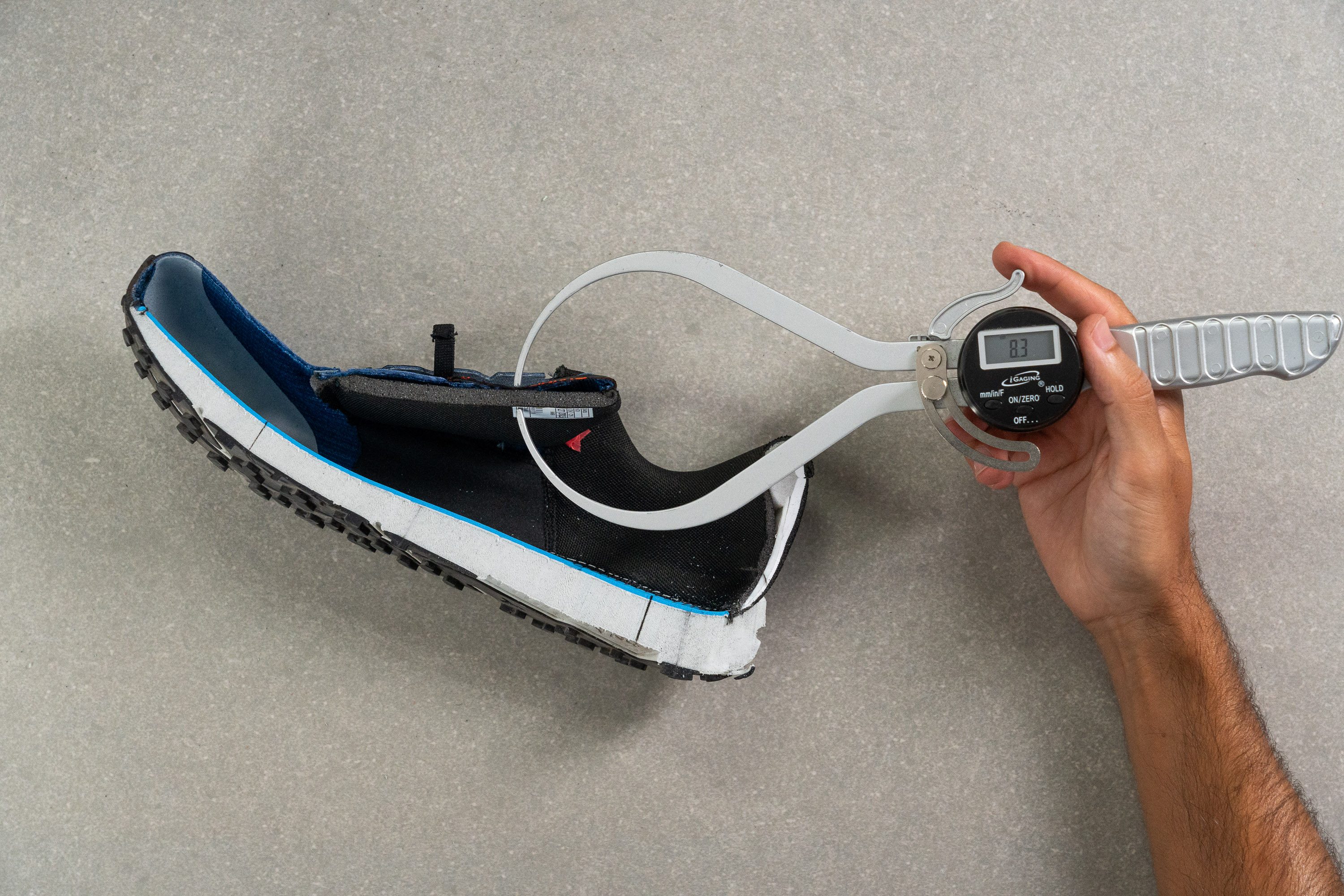
| Divide 4 | 8.3 mm |
| Average | 6.4 mm |
Tongue: gusset type
While technically semi-gusseted, the Divide 4’s gusset runs high up the tongue so there’s little to no chance of bits of debris finding their way into the shoe.
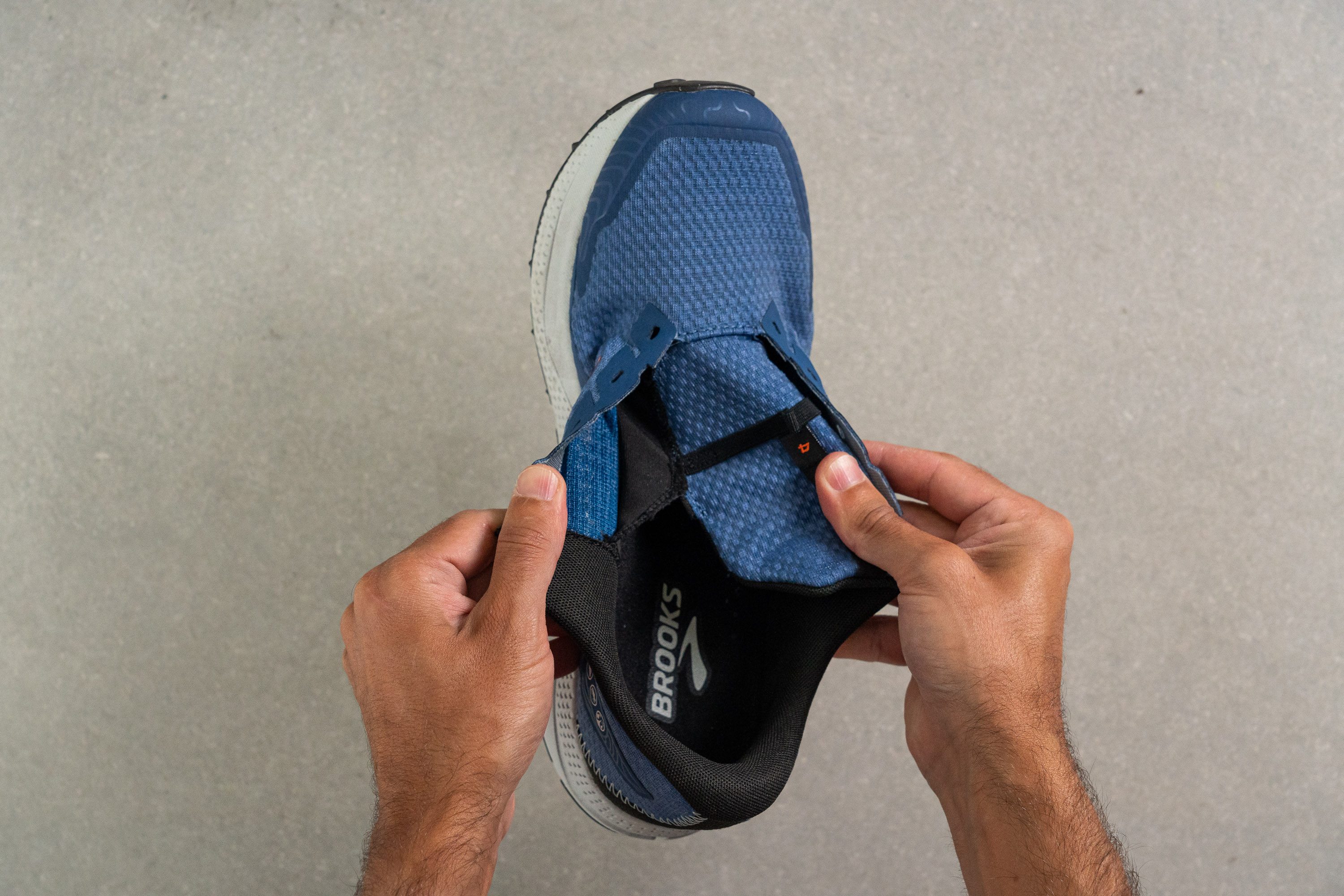
| Divide 4 | Both sides (semi) |
Lace garage
The Divide 4 features an elastic strap on the tongue with a handy finger loop which serves as a lace garage that keeps the laces from flailing about and getting snagged during our runs.
